C++标准库中函数对应的头文件
C语言头文件大全

标准C语言头文件ISO C标准定义的头文件(24项)<assert。
h> 验证程序断言〈complex。
h〉支持复数算术运算〈ctype。
h〉字符类型<errno。
h〉出错码<fenv。
h> 浮点环境〈float。
h> 浮点常量<inttypes。
h> 整型格式转换〈iso646.h〉替代关系操作符宏〈limits。
h> 实现常量<locale.h〉局部类别<math。
h〉数学常量〈setjmp.h> 非局部goto〈signal。
h> 信号〈stdarg。
h〉可变参数表〈stdbool.h> 布尔类型和值〈stddef。
h> 标准定义〈stdint.h〉整型<stdio。
h〉标准I/O库〈stdlib.h〉实用程序库函数〈string。
h〉字符串操作<tgmath.h〉通用类型数学宏<time.h> 时间和日期〈wchar。
h〉宽字符支持〈wctype.h〉宽字符分类和映射支持POSIX标准定义的必须的头文件(26项)〈dirent.h〉目录项<fcntl.h> 文件控制〈fnmatch。
h> 文件名匹配类型〈glob。
h> 路径名模式匹配类型〈grp。
h> 组文件〈netdb.h> 网络数据库操作〈pwd.h〉口令文件<regex。
h> 正则表达式〈tar。
h> tar归档值<termios。
h> 终端I/O <unistd.h> 符号常量<utime.h〉文件时间<wordexp。
h〉字扩展类型<arpa/inet.h> Internet定义<net/if.h> 套接字本地接口〈netinet/in.h> Internet地址族 <netinet/tcp.h〉传输控制协议〈sys/mman。
单片机C语言常用头文件

函数原形的头文件读者可参考返回非整型值的函数assert.h - assert(), 声明宏ctype.h –字符类型函数float.h –浮点数原形limits.h –数据类型的大小和范围math.h –浮点运算函数stdarg.h –变量参数表.stddef.h –标准定义stdio.h –标准输入输出IO 函数stdlib.h –包含内存分配函数的标准库string.h –字符串处理函数3 字符类型库下列函数按照输入的ACS II 字符集字符分类使用这些函数之前应当用"#include <ctype.h>" 包含int isalnum(int c)如果c 是数字或字母返回非零数值否则返回零int isalpha(int c)如果c 是字母返回非零数值否则返回零int iscntrl(int c)如果c 是控制字符如FF, BELL, LF ..等返回非零数值否则返回零int isdigit(int c)如果c 是数字返回非零数值否则返回零int isgraph(int c)如果c 是一个可打印字符而非空格返回非零数值否则返回零int islower(int c)如果c 是小写字母返回非零数值否则返回零int isprint(int c)如果c 是一个可打印字符返回非零数值否则返回零int ispunct(int c)如果c 是一个可打印字符而不是空格数字或字母返回非零数值否则返回零int isspace(int c)如果c 是一个空格字符返回非零数值包括空格CR, FF, HT, NL, 和VT 否则返回零int isupper(int c)如果c 是大写字母返回非零数值否则返回零int isxdigit(int c)如果c 是十六进制数字返回非零数值否则返回零int tolower(int c)如果c 是大写字母则返回c 对应的小写字母其它类型仍然返回cint toupper(int c)如果c 是小写字母则返回c 对应的大写字母其它类型仍然返回c4 浮点运算库下列函数支持浮点数运算使用这些函数之前必须用#include <math.h> 包含float asin(float x)以弧度形式返回x 的反正弦值float acos(float x)以弧度形式返回x 的反余弦值float atan(float x)以弧度形式返回x 的反正切值float atan2(float x, float y)返回y/x 的反正切其范围在- ~+ 之间float ceil(float x)返回对应x 的一个整型数小数部分四舍五入float cos(float x)返回以弧度形式表示的x 的余弦值float cosh(float x)返回x 的双曲余弦函数值float exp(float x)返回以e 为底的x 的幂即e xfloat exp10(float x)返回以10 为底的幂即10xfloat fabs(float x)返回x 的绝对值float floor(float x)返回不大于x 的最大整数float fmod(float x, float y)返回x/y 的余数float frexp(float x, int *pexp)把浮点数x 分解成数字部分y 尾数和以2 为底的指数n 两个部分即x=y 2 n y 的范围为0.5 y 1 y 值被函数返回而n 值存放到pexp 指向的变量中float fround(float x)返回最接近x 的整型数float ldexp(float x, int exp)返回x 2 e x pfloat log(float x)返回x 的自然对数float log10(float x)返回以10 为底的x 的对数float modf(float x, float *pint)把浮点数分解成整数部分和小数部分整数部分存放到pint 指向的变量小数部分应当大于或等于0 而小于1 并且作为函数返回值返回float pow(float x, float y)返回x y 值float sqrt(float x)返回x 的平方根float sin(float x)返回以弧度形式表示的x 的正弦值float sinh(float x)返回x 的双曲正弦函数值float tan(float x)返回以弧度形式表示的x 的正切值float tanh(float x)返回x 的双曲正切函数值5 标准输入输出库标准的文件输入输出是不能真正植入微控制器MCU 的标准stdio.h 的许多内容不可以使用不过有一些IO 函数是被支持的同样使用之前应用"#include <stdio.h>"预处理并且需要初始化输出端口最低层的IO 程序是单字符的输入(getchar)和输出(putchar)程序如果你针对不同的装置使用高层的IO 函数例如用printf 输出LCD 你需要全部重新定义最底层的函数为在ATMEL 的AVR Studio 模拟器终端IO 窗口使用标准IO 函数应当在编译选项中选中相应的单选钮注意作为缺省单字符输出函数putchar 是输出到UART 装置没有修改无论如何为使输出能如期望的那样出现在程序终端窗口中'\n' 字符必须被映射为成对的回车和换行CR/LFint getchar()使用查寻方式从UART 返回一个字符int printf(char *fmt, ..)按照格式说明符输出格式化文本frm 字符串格式说明符是标准格式的一个子集%d--输出有符号十进制整数%o --输出无符号八进制整数%x - 输出无符号十六进制整数%X –除了大写字母使用'A'-'F'外同%x%u - 输出无符号十进制整数%s –输出一个以C 中空字符NULL 结束的字符串%c –以ASCII 字符形式输出只输出一个字符%f –以小数形式输出浮点数%S –输出在FLASH 存贮器中的字符串常量printf 支持三个版本取决于你的特别需要和代码的大小越高的要求代码越大基本形: 只有%c, %d, %x, %u, 和%s 格式说明符是承认的长整形: 针对长整形数的修改%ld, %lu, %lx 被支持, 以适用于精度要求较高的领域浮点形: 全部格式包括%f 被支持你使用编译选项对话框来选择版本代码大小的增加是值得关注的int putchar(int c)输出单个字符这个库程序使用了UART 以查寻方式输出单个字符注意输出’\n’字符至程序终端窗口int puts(char *s)输出以NL 结尾的字符串int sprintf(char *buf, char *fmt)按照格式说明符输出格式化文本frm 字符串到一个缓冲区格式说明符同printf( )"const char *" 支持功能cprintf 和csprintf 是将FLASH 中的格式字符串分别以prinf 和sprinf 形式输出6 标准库和内存分配函数标准库头文件<stdlib.h>定义了宏NULL 和RAND_MAX 和新定义的类型size_t 并且描述了下列函数注意在你调用任意内存分配程序比如.. calloc malloc 和realloc)之前必须调用_NewHeap 来初始化堆heapint abs(int i)返回i 的绝对值int atoi(char *s)转换字符串s 为整型数并返回它字符串s 起始必须是整型数形式字符否则返回0double atof(const char *s)转换转换字符串s 为双精度浮点数并返回它字符串s 起始必须是浮点数形式字符串long atol(char *s)转换字符串s 为长整型数并返回它字符串s 起始必须是长整型数形式字符否则返回0void *calloc(size_t nelem, size_t size)分配"nelem"个数据项的内存连续空间每个数据项的大小为size 字节并且初始化为0 如果分配成功返回分配内存单元的首地址否则返回0void exit(status)终止程序运行典型的是无限循环它是担任用户main 函数的返回点void free(void *ptr)释放ptr 所指向的内存区void *malloc(size_t size)分配size 字节的存贮区如果分配成功则返回内存区地址如内存不够分配则返回0void _NewHeap(void *start, void *end)初始化内存分配程序的堆一个典型的调用是将符号_bss_end+1 的地址用作"start"值符号_bss_end 定义为编译器用来存放全局变量和字符串的数据内存的结束加1 的目的是堆栈检查函数使用_bss_end 字节存贮为标志字节这个结束值不能被放入堆栈中extern char _bss_end;_NewHeap(&_bss_end+1, &_bss_end + 201); // 初始化200 字节大小的堆int rand(void)返回一个在0 和RAND_MAX 之间的随机数void *realloc(void *ptr, size_t size)重新分配ptr 所指向内存区的大小为size 字节size 可比原来大或小返回指向该内存区的地址指针void srand(unsigned seed)初始化随后调用的随机数发生器的种子数long strtol(char *s, char **endptr, int base)按照"base."的格式转换"s"中起始字符为长整型数如果"endptr"不为空* endptr 将设定"s"中转换结束的位置unsigned long strtoul(char *s, char **endptr, int base)除了返回类型为无符号长整型数外其余同"strtol"7 字符串函数用"#include <string.h>"预处理后编译器支持下列函数<string.h>定义了NULL 类型size_t和下列字符串及字符阵列函数void *memchr(void *s, int c, size_t n)在字符串s 中搜索n 个字节长度寻找与c 相同的字符如果成功返回匹配字符的地址指针否则返回NULLint memcmp(void *s1, void *s2, size_t n)对字符串s1 和s2 的前n 个字符进行比较如果相同则返回0 如果s1 中字符大于s2 中字符则返回1 如果s1 中字符小于s2 中字符则返回-1void *memcpy(void *s1, void *s2, size_t n)拷贝s2 中n 个字符至s1 但拷贝区不可以重迭void *memmove(void *s1, void *s2, size_t n)拷贝s2 中n 个字符至s1 返回s1 其与memcpy 基本相同但拷贝区可以重迭void *memset(void *s, int c, size_t n)在s 中填充n 个字节的c 它返回schar *strcat(char *s1, char *s2)拷贝s2 到s1 的结尾返回s1char *strchr(char *s, int c)在s1 中搜索第一个出现的c 包括结束NULL 字符如果成功返回指向匹配字符的指针如果没有匹配字符找到返回空指针int strcmp(char *s1, char *s2)比较两个字符串如果相同返回0 如果s1>s2 则返回1 如果s1<s2 则返回-1char *strcpy(char *s1, char *s2)拷贝字符串s2 至字符串s1 返回s1size_t strcspn(char *s1, char *s2)在字符串s1 搜索与字符串s2 匹配的第一个字符包括结束NULL 字符其返回s1 中找到的匹配字符的索引size_t strlen(char *s)返回字符串s 的长度不包括结束NULL 字符char *strncat(char *s1, char *s2, size_t n)拷贝字符串s2 不含结束NULL 字符中n 个字符到s1 如果s2 长度比n 小则只拷贝s2返回s1int strncmp(char *s1, char *s2, size_t n)基本和strcmp 函数相同但其只比较前n 个字符char *strncpy(char *s1, char *s2, size_t n)基本和strcpy 函数相同但其只拷贝前n 个字符char *strpbrk(char *s1, char *s2)基本和strcspn 函数相同但它返回的是在s1 匹配字符的地址指针否则返回NULL 指针char *strrchr(char *s, int c)在字符串s 中搜索最后出现的c 并返回它的指针否则返回NULL .size_t strspn(char *s1, char *s2)在字符串s1 搜索与字符串s2 不匹配的第一个字符包括结束NULL 字符其返回s1 中找到的第一个不匹配字符的索引char *strstr(char *s1, char *s2)在字符串s1 中找到与s2 匹配的子字符串如果成功它返回s1 中匹配子字符串的地址指针否则返回NULL"const char *" 支持函数这些函数除了它的操作对象是在FLASH 中常数字符串外其余同c 中的函数size_t cstrlen(const char *s)char *cstrcpy(char *dst, const char *src);int cstrcmp(const char *s1, char *s2);8 变量参数函数<stdarg.h>提供再入式函数的变量参数处理它定义了不确定的类型va_list 和三个宏va_start(va_list foo, <last-arg>)初始化变量foova_arg(va_list foo, <promoted type>)访问下一个参数分派指定的类型注意那个类型必须是高级类型如int long 或double小的整型类型如"char"不能被支持va_end(va_list foo)结束变量参数处理例如printf()可以使用vfprintf()来实现#include <stdarg.h>int printf(char *fmt, ...){va_list ap;va_start(ap, fmt);vfprintf(fmt, ap);va_end(ap);}9 堆栈检查函数有几个库函数是用于检查堆栈是否溢出内存图如下如果硬件堆栈增长到软件堆栈中那么软件堆栈的内容将会被改变也就是说局部变量和别的堆栈项目被改变硬件堆栈是用作函数的返回地址如果你的函数调用层次太深偶然会发生这种情况同样地软件堆栈溢出进数据区域将会改变全局变量或其它静态分配的项目如果你使用动态分配内存还会改变堆项目这种情况在你定义了太多的局部变量或一个局部集合变量太大也会偶然发生高端地址硬件堆栈区警戒线软件堆栈区警戒线数据区低端地址警戒线启动代码写了一个正确的关于数据区的地址字节和一个类似的正确的关于软件堆栈的地址字节作为警戒线[注意如果你使用了你自己的启动文件而其又是以6.20 版本之前的启动文件为基础的你将需要额外改造为新的启动文件]注意如果你使用动态分配内存你必须跳过警戒线字节_bss_end 来分配你的堆参考内存分配函数堆栈检查你调用_StackCheck(void)函数来检查堆栈溢出如果警戒线字节仍然保持正确的值那么函数检查通过如果堆栈溢出那么警戒线字节将可能被破坏注意当你的程序堆栈溢出的时候你的程序将可能运行不正常或偶然崩溃当_StackCheck 检查错误条件时它调用了带一个参数的函数_StackOverflowed(char c) 如果参数是1 那么硬件堆栈有过溢出如果参数是0 那么软件堆栈曾经溢出在那个例子中制造了两个功能调用它是两个堆栈都可能溢出的无论如何在_StackOverflowed 执行起作用时第二个调用不可以出现作为例子如果函数复位了CPU 那么将不能返回_StackCheck 函数缺省的_StackOverflowed 函数当它被调用时库会用一个缺省的_StackOverflowed 函数来跳转到0 的位置因此复位CPU 和程序你可能希望用一个函数来代替它以指示更多的错__。
C语言这些常用的标准库(头文件),你不得不知道...
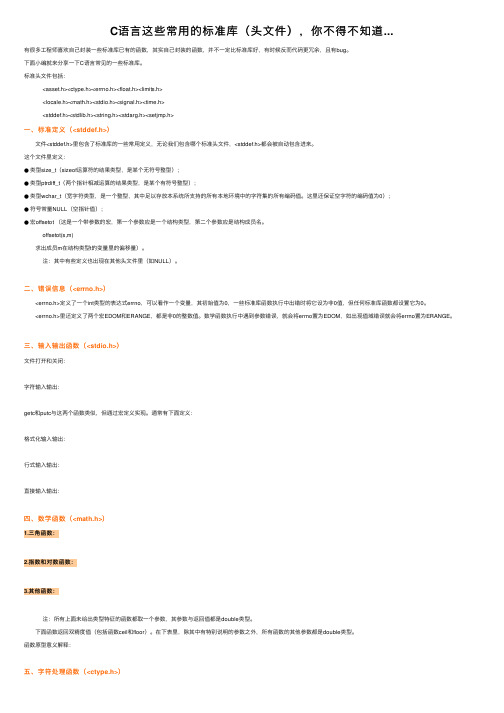
C语⾔这些常⽤的标准库(头⽂件),你不得不知道...有很多⼯程师喜欢⾃⼰封装⼀些标准库已有的函数,其实⾃⼰封装的函数,并不⼀定⽐标准库好,有时候反⽽代码更冗余,且有bug。
下⾯⼩编就来分享⼀下C语⾔常见的⼀些标准库。
标准头⽂件包括:<asset.h><ctype.h><errno.h><float.h><limits.h><locale.h><math.h><stdio.h><signal.h><time.h><stddef.h><stdlib.h><string.h><stdarg.h><setjmp.h>⼀、标准定义(<stddef.h>)⽂件<stddef.h>⾥包含了标准库的⼀些常⽤定义,⽆论我们包含哪个标准头⽂件,<stddef.h>都会被⾃动包含进来。
这个⽂件⾥定义:●类型size_t(sizeof运算符的结果类型,是某个⽆符号整型);●类型ptrdiff_t(两个指针相减运算的结果类型,是某个有符号整型);●类型wchar_t(宽字符类型,是⼀个整型,其中⾜以存放本系统所⽀持的所有本地环境中的字符集的所有编码值。
这⾥还保证空字符的编码值为0);●符号常量NULL(空指针值);●宏offsetot (这是⼀个带参数的宏,第⼀个参数应是⼀个结构类型,第⼆个参数应是结构成员名。
offsetot(s,m)求出成员m在结构类型t的变量⾥的偏移量)。
注:其中有些定义也出现在其他头⽂件⾥(如NULL)。
⼆、错误信息(<errno.h>)<errno.h>定义了⼀个int类型的表达式errno,可以看作⼀个变量,其初始值为0,⼀些标准库函数执⾏中出错时将它设为⾮0值,但任何标准库函数都设置它为0。
c 标准库函数手册

c 标准库函数手册C 标准库函数手册。
C 标准库函数是 C 语言提供的一组函数库,它包含了一系列常用的函数,可以帮助程序员更高效地完成各种任务。
本手册将介绍 C 标准库函数的常用函数及其用法,帮助读者更加深入地理解和运用这些函数。
一、stdio.h。
stdio.h 是 C 语言中用来进行输入输出操作的头文件,它包含了一系列与标准输入输出相关的函数。
其中,最常用的函数包括 printf、scanf、fopen、fclose 等。
这些函数可以帮助程序员进行屏幕输出、键盘输入、文件读写等操作。
例如,printf 函数可以用来向屏幕输出格式化的字符串,而 scanf 函数则可以用来从键盘接收输入并存储到变量中。
二、stdlib.h。
stdlib.h 是 C 语言中的标准库头文件之一,它包含了一系列与内存分配、随机数生成、字符串转换等功能相关的函数。
其中,最常用的函数包括 malloc、free、rand、atoi 等。
这些函数可以帮助程序员进行动态内存分配、随机数生成、字符串转换等操作。
例如,malloc 函数可以用来动态分配指定大小的内存空间,而 rand 函数则可以用来生成一个指定范围内的随机数。
三、math.h。
math.h 是 C 语言中的标准数学库头文件,它包含了一系列与数学运算相关的函数。
其中,最常用的函数包括 sin、cos、sqrt、pow 等。
这些函数可以帮助程序员进行各种数学运算,如三角函数计算、平方根计算、幂运算等。
例如,sin 函数可以用来计算给定角度的正弦值,而 sqrt 函数则可以用来计算一个数的平方根。
四、string.h。
string.h 是 C 语言中的标准字符串库头文件,它包含了一系列与字符串操作相关的函数。
其中,最常用的函数包括 strlen、strcpy、strcat、strcmp 等。
这些函数可以帮助程序员进行字符串的长度计算、复制、连接、比较等操作。
例如,strlen 函数可以用来计算一个字符串的长度,而 strcpy 函数则可以用来将一个字符串复制到另一个字符串中。
c语言_头文件_stdlib
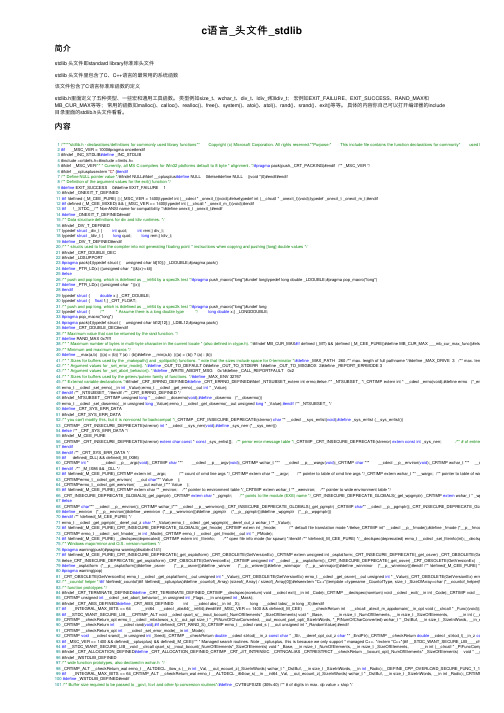
c语⾔_头⽂件_stdlib简介stdlib 头⽂件即standard library标准库头⽂件stdlib 头⽂件⾥包含了C、C++语⾔的最常⽤的系统函数该⽂件包含了C语⾔标准库函数的定义stdlib.h⾥⾯定义了五种类型、⼀些宏和通⽤⼯具函数。
类型例如size_t、wchar_t、div_t、ldiv_t和lldiv_t;宏例如EXIT_FAILURE、EXIT_SUCCESS、RAND_MAX和MB_CUR_MAX等等;常⽤的函数如malloc()、calloc()、realloc()、free()、system()、atoi()、atol()、rand()、srand()、exit()等等。
具体的内容你⾃⼰可以打开编译器的include⽬录⾥⾯的stdlib.h头⽂件看看。
内容1/*****stdlib.h - declarations/definitions for commonly used library functions** Copyright (c) Microsoft Corporation. All rights reserved.**Purpose:* This include file contains the function declarations for commonly* used library functio 2#if _MSC_VER > 1000#pragma once#endif3 #ifndef _INC_STDLIB#define _INC_STDLIB4 #include <crtdefs.h>#include <limits.h>5 #ifdef _MSC_VER/** * Currently, all MS C compilers for Win32 platforms default to 8 byte * alignment. */#pragma pack(push,_CRT_PACKING)#endif /** _MSC_VER */6 #ifdef __cplusplusextern "C" {#endif7/** Define NULL pointer value */#ifndef NULL#ifdef __cplusplus#define NULL 0#else#define NULL ((void *)0)#endif#endif8/** Definition of the argument values for the exit() function */9#define EXIT_SUCCESS 0#define EXIT_FAILURE 110 #ifndef _ONEXIT_T_DEFINED11#if !defined (_M_CEE_PURE) || (_MSC_VER < 1400)typedef int (__cdecl * _onexit_t)(void);#elsetypedef int (__clrcall * _onexit_t)(void);typedef _onexit_t _onexit_m_t;#endif12#if defined (_M_CEE_MIXED) && (_MSC_VER >= 1400)typedef int (__clrcall * _onexit_m_t)(void);#endif13#if !__STDC__/** Non-ANSI name for compatibility */#define onexit_t _onexit_t#endif14#define _ONEXIT_T_DEFINED#endif15/** Data structure definitions for div and ldiv runtimes. */16 #ifndef _DIV_T_DEFINED17 typedef struct _div_t { int quot; int rem;} div_t;18 typedef struct _ldiv_t { long quot; long rem;} ldiv_t;19#define _DIV_T_DEFINED#endif20/** * structs used to fool the compiler into not generating floating point * instructions when copying and pushing [long] double values */21 #ifndef _CRT_DOUBLE_DEC22 #ifndef _LDSUPPORT23#pragma pack(4)typedef struct { unsigned char ld[10];} _LDOUBLE;#pragma pack()24#define _PTR_LD(x) ((unsigned char *)(&(x)->ld))25#else26/** push and pop long, which is #defined as __int64 by a spec2k test */#pragma push_macro("long")#undef longtypedef long double _LDOUBLE;#pragma pop_macro("long")27#define _PTR_LD(x) ((unsigned char *)(x))28#endif29 typedef struct { double x;} _CRT_DOUBLE;30 typedef struct { float f;} _CRT_FLOAT;31/** push and pop long, which is #defined as __int64 by a spec2k test */#pragma push_macro("long")#undef long32 typedef struct { /** * Assume there is a long double type */long double x;} _LONGDOUBLE;33#pragma pop_macro("long")34#pragma pack(4)typedef struct { unsigned char ld12[12];} _LDBL12;#pragma pack()35#define _CRT_DOUBLE_DEC#endif36/** Maximum value that can be returned by the rand function. */37#define RAND_MAX 0x7fff38/** * Maximum number of bytes in multi-byte character in the current locale * (also defined in ctype.h). */#ifndef MB_CUR_MAX#if defined (_MT) && (defined (_M_CEE_PURE))#define MB_CUR_MAX ___mb_cur_max_func()#else#define MB_ 39/** Minimum and maximum macros */40#define __max(a,b) (((a) > (b)) ? (a) : (b))#define __min(a,b) (((a) < (b)) ? (a) : (b))41/** * Sizes for buffers used by the _makepath() and _splitpath() functions. * note that the sizes include space for 0-terminator */#define _MAX_PATH 260 /** max. length of full pathname */#define _MAX_DRIVE 3 /** max. length of drive c 42/** * Argument values for _set_error_mode(). */#define _OUT_TO_DEFAULT 0#define _OUT_TO_STDERR 1#define _OUT_TO_MSGBOX 2#define _REPORT_ERRMODE 343/** * Argument values for _set_abort_behavior(). */#define _WRITE_ABORT_MSG 0x1#define _CALL_REPORTFAULT 0x244/** * Sizes for buffers used by the getenv/putenv family of functions. */#define _MAX_ENV 3276745/** External variable declarations */#ifndef _CRT_ERRNO_DEFINED#define _CRT_ERRNO_DEFINED#ifdef _NTSUBSET_extern int errno;#else /** _NTSUBSET_ */_CRTIMP extern int * __cdecl _errno(void);#define errno (*_errno())46 errno_t __cdecl _set_errno(__in int _Value);errno_t __cdecl _get_errno(__out int * _Value);47#endif /** _NTSUBSET_ */#endif /** _CRT_ERRNO_DEFINED */48 #ifndef _NTSUBSET__CRTIMP unsigned long * __cdecl __doserrno(void);#define _doserrno (*__doserrno())49 errno_t __cdecl _set_doserrno(__in unsigned long _Value);errno_t __cdecl _get_doserrno(__out unsigned long * _Value);#endif /** _NTSUBSET_ */50#define _CRT_SYS_ERR_DATA51 #ifndef _CRT_SYS_ERR_DATA52/** you can't modify this, but it is non-const for backcompat */_CRTIMP _CRT_INSECURE_DEPRECATE(strerror) char ** __cdecl __sys_errlist(void);#define _sys_errlist (__sys_errlist())53 _CRTIMP _CRT_INSECURE_DEPRECATE(strerror) int * __cdecl __sys_nerr(void);#define _sys_nerr (*__sys_nerr())54#else /** _CRT_SYS_ERR_DATA */55 #ifndef _M_CEE_PURE56 _CRTIMP _CRT_INSECURE_DEPRECATE(strerror) extern char const * const _sys_errlist[]; /** perror error message table */_CRTIMP _CRT_INSECURE_DEPRECATE(strerror) extern const int _sys_nerr; /** # of entries in sys_errlis 57#endif58#endif /** _CRT_SYS_ERR_DATA */59#if defined(_DLL) && defined(_M_IX86)60 _CRTIMP int * __cdecl __p___argc(void);_CRTIMP char *** __cdecl __p___argv(void);_CRTIMP wchar_t *** __cdecl __p___wargv(void);_CRTIMP char *** __cdecl __p__environ(void);_CRTIMP wchar_t *** __cdecl __p__w 61#endif /** _M_IX86 && _DLL */62#if !defined(_M_CEE_PURE)_CRTIMP extern int __argc; /** count of cmd line args */_CRTIMP extern char ** __argv; /** pointer to table of cmd line args */_CRTIMP extern wchar_t ** __wargv; /** pointer to table of wide cmd line ar63 _CRTIMPerrno_t__cdecl_get_environ( __out char*** Value );64 _CRTIMPerrno_t__cdecl_get_wenviron( __out wchar_t*** Value );65#if !defined(_M_CEE_PURE)_CRTIMP extern char ** _environ; /** pointer to environment table */_CRTIMP extern wchar_t ** _wenviron; /** pointer to wide environment table */66 _CRT_INSECURE_DEPRECATE_GLOBALS(_get_pgmptr) _CRTIMP extern char * _pgmptr; /** points to the module (EXE) name */_CRT_INSECURE_DEPRECATE_GLOBALS(_get_wpgmptr) _CRTIMP extern wchar_t * _wpgmptr;67#else68 _CRTIMP char*** __cdecl __p__environ();_CRTIMP wchar_t*** __cdecl __p__wenviron();_CRT_INSECURE_DEPRECATE_GLOBALS(_get_pgmptr) _CRTIMP char** __cdecl __p__pgmptr();_CRT_INSECURE_DEPRECATE_GLOBALS(_get_ 69#define _environ (*__p__environ())#define _wenviron (*__p__wenviron())#define _pgmptr (*__p__pgmptr())#define _wpgmptr (*__p__wpgmptr())70#endif /** !defined(_M_CEE_PURE) */71 errno_t __cdecl _get_pgmptr(__deref_out_z char ** _Value);errno_t __cdecl _get_wpgmptr(__deref_out_z wchar_t ** _Value);72#if !defined(_M_CEE_PURE)_CRT_INSECURE_DEPRECATE_GLOBALS(_get_fmode) _CRTIMP extern int _fmode; /** default file translation mode */#else_CRTIMP int* __cdecl __p__fmode();#define _fmode (*__p__fmode())#endif /** 73 _CRTIMP errno_t __cdecl _set_fmode(__in int _Mode);_CRTIMP errno_t __cdecl _get_fmode(__out int * _PMode);74#if !defined(_M_CEE_PURE) __declspec(deprecated) _CRTIMP extern int _fileinfo; /** open file info mode (for spawn) */#endif /** !defined(_M_CEE_PURE) */__declspec(deprecated) errno_t __cdecl _set_fileinfo(int);__declspec(deprecate 75/** Windows major/minor and O.S. version numbers */76#pragma warning(push)#pragma warning(disable:4141)77#if !defined(_M_CEE_PURE)_CRT_INSECURE_DEPRECATE(_get_osplatform) _CRT_OBSOLETE(GetVersionEx) _CRTIMP extern unsigned int _osplatform;_CRT_INSECURE_DEPRECATE(_get_osver) _CRT_OBSOLETE(GetVersionEx) 78 #else_CRT_INSECURE_DEPRECATE(_get_osplatform) _CRT_OBSOLETE(GetVersionEx) _CRTIMP unsigned int* __cdecl __p__osplatform();_CRT_INSECURE_DEPRECATE(_get_osver) _CRT_OBSOLETE(GetVersionEx) _CRTIMP uns 79#define _osplatform (*__p__osplatform())#define _osver (*__p__osver())#define _winver (*__p__winver())#define _winmajor (*__p__winmajor())#define _winminor (*__p__winminor())#endif /** !defined(_M_CEE_PURE) */80#pragma warning(pop)81 _CRT_OBSOLETE(GetVersionEx) errno_t __cdecl _get_osplatform(__out unsigned int * _Value);_CRT_OBSOLETE(GetVersionEx) errno_t __cdecl _get_osver(__out unsigned int * _Value);_CRT_OBSOLETE(GetVersionEx) errno_t __cdecl _ 82/** _countof helper */#if !defined(_countof)#if !defined(__cplusplus)#define _countof(_Array) (sizeof(_Array) / sizeof(_Array[0]))#elseextern "C++"{template <typename _CountofType, size_t _SizeOfArray>char (*__countof_helper(UNALIGNED 83/** function prototypes */84 #ifndef _CRT_TERMINATE_DEFINED#define _CRT_TERMINATE_DEFINED_CRTIMP __declspec(noreturn) void __cdecl exit(__in int _Code);_CRTIMP __declspec(noreturn) void __cdecl _exit(__in int _Code);_CRTIMP void __cdecl abort(v85 _CRTIMP unsigned int __cdecl _set_abort_behavior(__in unsigned int _Flags, __in unsigned int _Mask);86 #ifndef _CRT_ABS_DEFINED#define _CRT_ABS_DEFINED int __cdecl abs(__in int _X); long __cdecl labs(__in long _X);#endif87#if _INTEGRAL_MAX_BITS >= 64 __int64 __cdecl _abs64(__int64);#endif#if _MSC_VER >= 1400 && defined(_M_CEE) __checkReturn int __clrcall _atexit_m_appdomain(__in_opt void (__clrcall * _Func)(void));#if defined(_M 88#if __STDC_WANT_SECURE_LIB___CRTIMP_ALT void __cdecl qsort_s(__inout_bcount(_NumOfElements* _SizeOfElements) void * _Base, __in rsize_t _NumOfElements, __in rsize_t _SizeOfElements, __in int (__cdecl * _PtFu89 _CRTIMP __checkReturn_opt errno_t __cdecl _mbstowcs_s_l(__out_opt size_t * _PtNumOfCharConverted, __out_ecount_part_opt(_SizeInWords, *_PtNumOfCharConverted) wchar_t * _DstBuf, __in size_t _SizeInWords, __in_ecount_z(_Ma90 _CRTIMP __checkReturn int __cdecl rand(void);#if defined(_CRT_RAND_S)_CRTIMP errno_t __cdecl rand_s ( __out unsigned int *_RandomValue);#endif91 _CRTIMP __checkReturn_opt int __cdecl _set_error_mode(__in int _Mode);92 _CRTIMP void __cdecl srand(__in unsigned int _Seed);_CRTIMP __checkReturn double __cdecl strtod(__in_z const char * _Str, __deref_opt_out_z char ** _EndPtr);_CRTIMP __checkReturn double __cdecl _strtod_l(__in_z const93#if _MSC_VER >= 1400 && defined(__cplusplus) && defined(_M_CEE)/** * Managed search routines. Note __cplusplus, this is because we only support * managed C++. */extern "C++"{#if __STDC_WANT_SECURE_LIB____checkReturn vo 94#if __STDC_WANT_SECURE_LIB__void __clrcall qsort_s(__inout_bcount(_NumOfElements*_SizeOfElements) void * _Base, __in rsize_t _NumOfElements, __in rsize_t _SizeOfElements, __in int (__clrcall * _PtFuncCompare)(void *, c95 #ifndef _CRT_ALLOCATION_DEFINED#define _CRT_ALLOCATION_DEFINED_CRTIMP _CRT_JIT_INTRINSIC _CRTNOALIAS _CRTRESTRICT __checkReturn __bcount_opt(_NumOfElements* _SizeOfElements) void * __cdecl calloc(_96 #ifndef _WSTDLIB_DEFINED97/** wide function prototypes, also declared in wchar.h */98 _CRTIMP_ALT __checkReturn_wat errno_t __ALTDECL _itow_s (__in int _Val, __out_ecount_z(_SizeInWords) wchar_t * _DstBuf, __in size_t _SizeInWords, __in int _Radix);__DEFINE_CPP_OVERLOAD_SECURE_FUNC_1_1(errno_t, _itow 99#if _INTEGRAL_MAX_BITS >= 64_CRTIMP_ALT __checkReturn_wat errno_t __ALTDECL _i64tow_s(__in __int64 _Val, __out_ecount_z(_SizeInWords) wchar_t * _DstBuf, __in size_t _SizeInWords, __in int _Radix);_CRTIMP _CRT_INSE 100#define _WSTDLIB_DEFINED#endif101/** Buffer size required to be passed to _gcvt, fcvt and other fp conversion routines*/#define _CVTBUFSIZE (309+40) /** # of digits in max. dp value + slop */102#if (defined(_DEBUG) || defined(_SYSCRT_DEBUG)) && defined(_CRTDBG_MAP_ALLOC)#pragma push_macro("_fullpath")#undef _fullpath#endif103 _CRTIMP __checkReturn char * __cdecl _fullpath(__out_ecount_z_opt(_SizeInBytes) char * _FullPath, __in_z const char * _Path, __in size_t _SizeInBytes);104#if (defined(_DEBUG) || defined(_SYSCRT_DEBUG)) && defined(_CRTDBG_MAP_ALLOC)#pragma pop_macro("_fullpath")#endif105 _CRTIMP_ALT __checkReturn_wat errno_t __cdecl _ecvt_s(__out_ecount_z(_Size) char * _DstBuf, __in size_t _Size, __in double _Val, __in int _NumOfDights, __out int * _PtDec, __out int * _PtSign);__DEFINE_CPP_OVERLOAD_SECUR 106 _CRTIMP __checkReturn int __cdecl _atodbl(__out _CRT_DOUBLE * _Result, __in_z char * _Str);_CRTIMP __checkReturn int __cdecl _atoldbl(__out _LDOUBLE * _Result, __in_z char * _Str);_CRTIMP __checkReturn int __cdecl _atoflt(__ 107#if _MSC_VER >= 1400 && defined(_M_CEE) _onexit_m_t __clrcall _onexit_m_appdomain(_onexit_m_t _Function); #if defined(_M_CEE_MIXED) _onexit_m_t __clrcall _onexit_m(_onexit_m_t _Function); #else inline _onexit_m_t __ 108 _CRT_INSECURE_DEPRECATE(_splitpath_s) _CRTIMP void __cdecl _splitpath(__in_z const char * _FullPath, __out_z_opt char * _Drive, __out_z_opt char * _Dir, __out_z_opt char * _Filename, __out_z_opt char * _Ext);_CRTIMP_ALT _ 109 _CRTIMP void __cdecl _swab(__inout_ecount_full(_SizeInBytes) char * _Buf1, __inout_ecount_full(_SizeInBytes) char * _Buf2, int _SizeInBytes);110 #ifndef _WSTDLIBP_DEFINED111/** wide function prototypes, also declared in wchar.h */112#if (defined(_DEBUG) || defined(_SYSCRT_DEBUG)) && defined(_CRTDBG_MAP_ALLOC)#pragma push_macro("_wfullpath")#undef _wfullpath#endif113 _CRTIMP __checkReturn wchar_t * __cdecl _wfullpath(__out_ecount_z_opt(_SizeInWords) wchar_t * _FullPath, __in_z const wchar_t * _Path, __in size_t _SizeInWords);114#if (defined(_DEBUG) || defined(_SYSCRT_DEBUG)) && defined(_CRTDBG_MAP_ALLOC)#pragma pop_macro("_wfullpath")#endif115 _CRTIMP_ALT __checkReturn_wat errno_t __ALTDECL _wmakepath_s(__out_ecount_z(_SizeInWords) wchar_t * _PathResult, __in_opt size_t _SizeInWords, __in_z_opt const wchar_t * _Drive, __in_z_opt const wchar_t * _Dir, __in_z_opt 116#define _WSTDLIBP_DEFINED#endif117/** The Win32 API SetErrorMode, Beep and Sleep should be used instead. */_CRT_OBSOLETE(SetErrorMode) _CRTIMP void __cdecl _seterrormode(__in int _Mode);_CRT_OBSOLETE(Beep) _CRTIMP void __cdecl _beep(__in unsigned _F 118#if !__STDC__119/** Non-ANSI names for compatibility */120 #ifndef __cplusplus#define max(a,b) (((a) > (b)) ? (a) : (b))#define min(a,b) (((a) < (b)) ? (a) : (b))#endif121#define sys_errlist _sys_errlist#define sys_nerr _sys_nerr#define environ _environ122#pragma warning(push)#pragma warning(disable: 4141) /** Using deprecated twice */ _CRT_NONSTDC_DEPRECATE(_ecvt) _CRT_INSECURE_DEPRECATE(_ecvt_s) _CRTIMP __checkReturn char * __cdecl ecvt(__in double _Val, __in in 123#endif /** __STDC__ */124 #ifdef __cplusplus}125#endif126 #ifdef _MSC_VER#pragma pack(pop)#endif /** _MSC_VER */127#endif /** _INC_STDLIB *//** 88bf0570-3001-4e78-a5f2-be5765546192 */View Code包含的函数输⼊样式:C语⾔模式:#include <stdlib.h>C++样式:#include <cstdlib>1函数名称:calloc函数原型: void * calloc(unsigned n,unsigned size);函数功能: 分配n个数据项的内存连续空间,每个数据项的⼤⼩为size函数返回: 分配内存单元的起始地址,如果不成功,返回02函数名称:free函数原型: void free(void* p);函数功能: 释放p所指的内存区函数返回:参数说明: p-被释放的指针3函数名称:malloc函数原型: void * malloc(unsigned size);函数功能: 分配size字节的存储区函数返回: 所分配的内存区地址,如果内存不够,返回04函数名称: realloc函数原型: void * realloc(void * p,unsigned size);函数功能: 将p所指出的已分配内存区的⼤⼩改为size,size可以⽐原来分配的空间⼤或⼩函数返回: 返回指向该内存区的指针.NULL-分配失败5函数名称: rand函数原型: int rand(void);函数功能: 产⽣0到32767间的随机整数(0到0x7fff之间)函数返回: 随机整数6函数名称: abort函数原型: void abort(void)函数功能: 异常终⽌⼀个进程.7函数名称: exit函数原型: void exit(int state)函数功能: 程序中⽌执⾏,返回调⽤过程函数返回:参数说明: state:0-正常中⽌,⾮0-⾮正常中⽌8函数名称: getenv函数原型: char* getenv(const char *name)函数功能: 返回⼀个指向环境变量的指针函数返回:环境变量的定义参数说明: name-环境字符串9函数名称: putenv函数原型: int putenv(const char *name)函数功能: 将字符串name增加到DOS环境变量中函数返回: 0:操作成功,-1:操作失败参数说明: name-环境字符串10函数名称: labs函数原型: long labs(long num)函数功能: 求长整型参数的绝对值函数返回:绝对值11函数名称: atof函数原型: double atof(char *str)函数功能: 将字符串转换成⼀个双精度数值函数返回: 转换后的数值参数说明: str-待转换浮点型数的字符串12函数名称: atoi函数原型: int atoi(char *str)函数功能: 将字符串转换成⼀个整数值函数返回: 转换后的数值参数说明: str-待转换为整型数的字符串13函数名称: atol函数原型: long atol(char *str)函数功能: 将字符串转换成⼀个长整数函数返回: 转换后的数值参数说明: str-待转换为长整型的字符串14函数名称:ecvt函数原型: char *ecvt(double value,int ndigit,int *dec,int *sign)函数功能: 将浮点数转换为字符串函数返回: 转换后的字符串指针参数说明: value-待转换底浮点数,ndigit-转换后的字符串长度15函数名称:fcvt函数原型: char *fcvt(double value,int ndigit,int *dec,int *sign)函数功能: 将浮点数变成⼀个字符串函数返回: 转换后字符串指针参数说明: value-待转换底浮点数,ndigit-转换后底字符串长度。
C++常用标准库函数
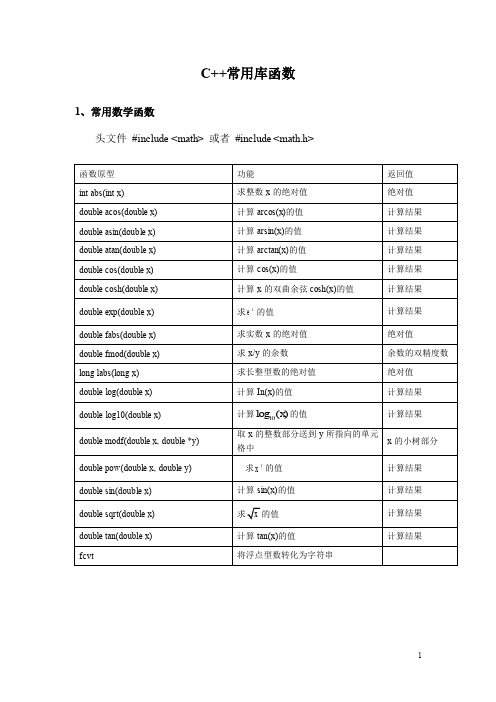
C++常用库函数1、常用数学函数头文件#include <math> 或者#include <math.h>2、常用字符串处理函数头文件#include <string> 或者#include <string.h>3、其他常用函数头文件#include <stdlib> 或者#include <stdlib.h>4、实现键盘和文件输入/输出的成员函数头文件#include <iostream> 或者#include <iostream.h>C++的头文件!#include <ctype.h>//字符处理#include <errno.h>//定义错误码#include <float.h>//浮点数处理#include <fstream.h>//文件输入/输出#include <iomanip.h>//参数化输入/输出#include <iostream.h> //数据流输入/输出#include <limits.h> //定义各种数据类型最值常量#include <locale.h> //定义本地化函数#include <math.h> //定义数学函数#include <stdio.h> //定义输入/输出函数#include <stdlib.h> //定义杂项函数及内存分配函数#include <string.h> //字符串处理#include <strstrea.h> //基于数组的输入/输出#include <time.h> //定义关于时间的函数#include <wchar.h> //宽字符处理及输入/输出#include <wctype.h> //宽字符分类标准C++ (同上的不再注释)#include <algorithm> //STL 通用算法#include <bitset> //STL 位集容器#include <cctype>#include <cerrno>#include <clocale>#include <cmath>#include <complex> //复数类#include <cstdio>#include <cstdlib>#include <cstring>#include <ctime>#include <deque> //STL 双端队列容器#include <exception> //异常处理类#include <fstream>#include <functional> //STL 定义运算函数(代替运算符)#include <limits>#include <list> //STL 线性列表容器#include <map> //STL 映射容器#include <iomanip>#include <ios> //基本输入/输出支持#include <iosfwd> //输入/输出系统使用的前置声明#include <iostream>#include <istream> //基本输入流#include <ostream> //基本输出流#include <queue> //STL 队列容器#include <set> //STL 集合容器#include <sstream> //基于字符串的流#include <stack> //STL 堆栈容器#include <stdexcept> //标准异常类#include <streambuf> //底层输入/输出支持#include <string> //字符串类#include <utility> //STL 通用模板类#include <vector> //STL 动态数组容器#include <cwchar>#include <cwctype>using namespace std;C99 增加#include //复数处理#include //浮点环境#include //整数格式转换#include //布尔环境#include //整型环境#include //通用类型数学宏数学函数,所在函数库为math.h、stdlib.h、string.h、float.hint abs(int i) 返回整型参数i的绝对值double cabs(struct complex znum) 返回复数znum的绝对值double fabs(double x) 返回双精度参数x的绝对值long labs(long n) 返回长整型参数n的绝对值double exp(double x) 返回指数函数ex的值double frexp(double value,int *eptr) 返回value=x*2n中x的值,n存贮在eptr中double ldexp(double value,int exp); 返回value*2exp的值double log(double x) 返回logex的值double log10(double x) 返回log10x的值double pow(double x,double y) 返回xy的值double pow10(int p) 返回10p的值double sqrt(double x) 返回+√x的值double acos(double x) 返回x的反余弦cos-1(x)值,x为弧度double asin(double x) 返回x的反正弦sin-1(x)值,x为弧度double atan(double x) 返回x的反正切tan-1(x)值,x为弧度double atan2(double y,double x) 返回y/x的反正切tan-1(x)值,y的x为弧度double cos(double x) 返回x的余弦cos(x)值,x为弧度double sin(double x) 返回x的正弦sin(x)值,x为弧度double tan(double x) 返回x的正切tan(x)值,x为弧度double cosh(double x) 返回x的双曲余弦cosh(x)值,x为弧度double sinh(double x) 返回x的双曲正弦sinh(x)值,x为弧度double tanh(double x) 返回x的双曲正切tanh(x)值,x为弧度double hypot(double x,double y) 返回直角三角形斜边的长度(z),x和y为直角边的长度,z2=x2+y2double ceil(double x) 返回不小于x的最小整数double floor(double x) 返回不大于x的最大整数void srand(unsigned seed) 初始化随机数发生器int rand() 产生一个随机数并返回这个数double poly(double x,int n,double c[])从参数产生一个多项式double modf(double value,double *iptr)将双精度数value分解成尾数和阶double fmod(double x,double y) 返回x/y的余数double frexp(double value,int *eptr) 将双精度数value分成尾数和阶double atof(char *nptr) 将字符串nptr转换成浮点数并返回这个浮点数double atoi(char *nptr) 将字符串nptr转换成整数并返回这个整数double atol(char *nptr) 将字符串nptr转换成长整数并返回这个整数char *ecvt(double value,int ndigit,int *decpt,int *sign)将浮点数value转换成字符串并返回该字符串char *fcvt(double value,int ndigit,int *decpt,int *sign)将浮点数value转换成字符串并返回该字符串char *gcvt(double value,int ndigit,char *buf)将数value转换成字符串并存于buf中,并返回buf的指针char *ultoa(unsigned long value,char *string,int radix)将无符号整型数value转换成字符串并返回该字符串,radix为转换时所用基数char *ltoa(long value,char *string,int radix)将长整型数value转换成字符串并返回该字符串,radix为转换时所用基数char *itoa(int value,char *string,int radix)将整数value转换成字符串存入string,radix为转换时所用基数double atof(char *nptr) 将字符串nptr转换成双精度数,并返回这个数,错误返回0int atoi(char *nptr) 将字符串nptr转换成整型数, 并返回这个数,错误返回0long atol(char *nptr) 将字符串nptr转换成长整型数,并返回这个数,错误返回0double strtod(char *str,char **endptr)将字符串str转换成双精度数,并返回这个数,long strtol(char *str,char **endptr,int base)将字符串str转换成长整型数, 并返回这个数,int matherr(struct exception *e)用户修改数学错误返回信息函数(没有必要使用)double _matherr(_mexcep why,char *fun,double *arg1p,double *arg2p,double retval)用户修改数学错误返回信息函数(没有必要使用)unsigned int _clear87() 清除浮点状态字并返回原来的浮点状态void _fpreset() 重新初使化浮点数学程序包unsigned int _status87() 返回浮点状态字目录函数,所在函数库为dir.h、dos.hint chdir(char *path) 使指定的目录path(如:"C:\\WPS")变成当前的工作目录,成功返回0int findfirst(char *pathname,struct ffblk *ffblk,intattrib)查找指定的文件,成功返回0pathname为指定的目录名和文件名,如"C:\\WPS\\TXT"ffblk为指定的保存文件信息的一个结构,定义如下:┏━━━━━━━━━━━━━━━━━━┓┃struct ffblk┃┃{ ┃┃char ff_reserved[21]; /*DOS保留字*/┃┃char ff_attrib; /*文件属性*/ ┃┃int ff_ftime; /*文件时间*/ ┃┃int ff_fdate; /*文件日期*/ ┃┃long ff_fsize; /*文件长度*/ ┃┃char ff_name[13]; /*文件名*/ ┃┃} ┃┗━━━━━━━━━━━━━━━━━━┛attrib为文件属性,由以下字符代表┏━━━━━━━━━┳━━━━━━━━┓┃FA_RDONL Y 只读文件┃FA_LABEL 卷标号┃┃FA_HIDDEN 隐藏文件┃FA_DIREC 目录┃┃FA_SYSTEM 系统文件┃FA_ARCH 档案┃┗━━━━━━━━━┻━━━━━━━━┛例:struct ffblk ff;findfirst("*.wps",&ff,FA_RDONL Y);int findnext(struct ffblk *ffblk) 取匹配finddirst的文件,成功返回0 void fumerge(char *path,char *drive,char *dir,char *name,char *ext)此函数通过盘符drive(C:、A:等),路径dir(\TC、\BC\LIB等),文件名name(TC、WPS等),扩展名ext(.EXE、.COM等)组成一个文件名存与path中.int fnsplit(char *path,char *drive,char *dir,char *name,char *ext)此函数将文件名path分解成盘符drive(C:、A:等),路径dir(\TC、\BC\LIB 等),文件名name(TC、WPS等),扩展名ext(.EXE、.COM等),并分别存入相应的变量中.int getcurdir(int drive,char *direc) 此函数返回指定驱动器的当前工作目录名称drive 指定的驱动器(0=当前,1=A,2=B,3=C等)direc 保存指定驱动器当前工作路径的变量成功返回0char *getcwd(char *buf,iint n) 此函数取当前工作目录并存入buf中,直到n个字节长为为止.错误返回NULLint getdisk() 取当前正在使用的驱动器,返回一个整数(0=A,1=B,2=C 等)int setdisk(int drive) 设置要使用的驱动器drive(0=A,1=B,2=C等),返回可使用驱动器总数int mkdir(char *pathname) 建立一个新的目录pathname,成功返回0 int rmdir(char *pathname) 删除一个目录pathname,成功返回0char *mktemp(char *template) 构造一个当前目录上没有的文件名并存于template中char *searchpath(char *pathname) 利用MSDOS找出文件filename所在路径,,此函数使用DOS的PA TH变量,未找到文件返回NULL 进程函数,所在函数库为stdlib.h、process.hvoid abort() 此函数通过调用具有出口代码3的_exit写一个终止信息于stderr,并异常终止程序。
常用C语言标准库函数
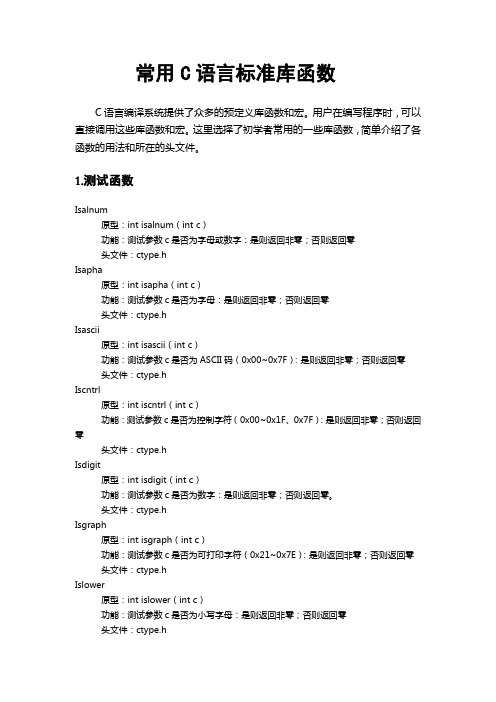
常用C语言标准库函数C语言编译系统提供了众多的预定义库函数和宏。
用户在编写程序时,可以直接调用这些库函数和宏。
这里选择了初学者常用的一些库函数,简单介绍了各函数的用法和所在的头文件。
1.测试函数Isalnum原型:int isalnum(int c)功能:测试参数c是否为字母或数字:是则返回非零;否则返回零头文件:ctype.hIsapha原型:int isapha(int c)功能:测试参数c是否为字母:是则返回非零;否则返回零头文件:ctype.hIsascii原型:int isascii(int c)功能:测试参数c是否为ASCII码(0x00~0x7F):是则返回非零;否则返回零头文件:ctype.hIscntrl原型:int iscntrl(int c)功能:测试参数c是否为控制字符(0x00~0x1F、0x7F):是则返回非零;否则返回零头文件:ctype.hIsdigit原型:int isdigit(int c)功能:测试参数c是否为数字:是则返回非零;否则返回零。
头文件:ctype.hIsgraph原型:int isgraph(int c)功能:测试参数c是否为可打印字符(0x21~0x7E):是则返回非零;否则返回零头文件:ctype.hIslower原型:int islower(int c)功能:测试参数c是否为小写字母:是则返回非零;否则返回零头文件:ctype.hIsprint原型:int isprint(int c)功能:测试参数c是否为可打印字符(含空格符0x20~0x7E):是则返回非零;否则返回零头文件:ctype.hIspunct原型:int ispunct(int c)功能:测试参数c是否为标点符号:是则返回非零;否则返回零头文件:ctype.hIsupper原型:int isupper(inr c)功能:测试参数c是否为大写字母:是则返回非零;否则返回零Isxdigit原型:int isxdigit(int c)功能:测试参数c是否为十六进制数:是则返回非零;否则返回零2.数学函数abs原型:int abs(int i)功能:返回整数型参数i的绝对值头文件:stdlib.h,math.hacos原型:double acos(double x)功能:返回双精度参数x的反余弦三角函数值头文件:math.hasin原型:double asin(double x)功能:返回双精度参数x的反正弦三角函数值头文件:math.hatan原型:double atan(double x)功能:返回双精度参数的反正切三角函数值头文件:math.hatan2原型:double atan2(double y,double x)功能:返回双精度参数y和x由式y/x所计算的反正切三角函数值头文件:math.hcabs原型:double cabs(struct complex znum)功能:返回一个双精度数,为计算出复数znum的绝对值。
C语言头文件大全
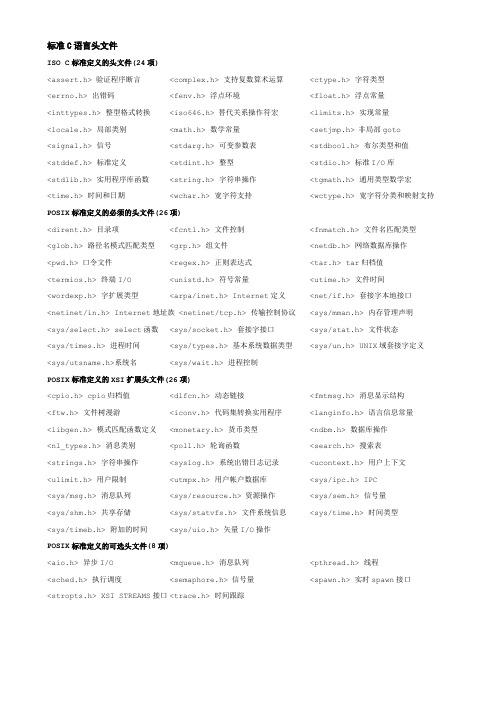
标准C语言头文件ISO C标准定义的头文件(24项)<assert.h> 验证程序断言<complex.h> 支持复数算术运算<ctype.h> 字符类型<errno.h> 出错码<fenv.h> 浮点环境<float.h> 浮点常量<inttypes.h> 整型格式转换<iso646.h> 替代关系操作符宏<limits.h> 实现常量<locale.h> 局部类别<math.h> 数学常量<setjmp.h> 非局部goto<signal.h> 信号<stdarg.h> 可变参数表<stdbool.h> 布尔类型和值<stddef.h> 标准定义<stdint.h> 整型<stdio.h> 标准I/O库<stdlib.h> 实用程序库函数<string.h> 字符串操作<tgmath.h> 通用类型数学宏<time.h> 时间和日期<wchar.h> 宽字符支持<wctype.h> 宽字符分类和映射支持POSIX标准定义的必须的头文件(26项)<dirent.h> 目录项<fcntl.h> 文件控制<fnmatch.h> 文件名匹配类型<glob.h> 路径名模式匹配类型<grp.h> 组文件<netdb.h> 网络数据库操作<pwd.h> 口令文件<regex.h> 正则表达式<tar.h> tar归档值<termios.h> 终端I/O <unistd.h> 符号常量<utime.h> 文件时间<wordexp.h> 字扩展类型<arpa/inet.h> Internet定义<net/if.h> 套接字本地接口<netinet/in.h> Internet地址族 <netinet/tcp.h> 传输控制协议<sys/mman.h> 内存管理声明<sys/select.h> select函数<sys/socket.h> 套接字接口<sys/stat.h> 文件状态<sys/times.h> 进程时间<sys/types.h> 基本系统数据类型<sys/un.h> UNIX域套接字定义<sys/utsname.h>系统名<sys/wait.h> 进程控制POSIX标准定义的XSI扩展头文件(26项)<cpio.h> cpio归档值<dlfcn.h> 动态链接<fmtmsg.h> 消息显示结构<ftw.h> 文件树漫游<iconv.h> 代码集转换实用程序<langinfo.h> 语言信息常量<libgen.h> 模式匹配函数定义<monetary.h> 货币类型<ndbm.h> 数据库操作<nl_types.h> 消息类别<poll.h> 轮询函数<search.h> 搜索表<strings.h> 字符串操作<syslog.h> 系统出错日志记录<ucontext.h> 用户上下文<ulimit.h> 用户限制<utmpx.h> 用户帐户数据库<sys/ipc.h> IPC<sys/msg.h> 消息队列<sys/resource.h> 资源操作<sys/sem.h> 信号量<sys/shm.h> 共享存储<sys/statvfs.h> 文件系统信息<sys/time.h> 时间类型<sys/timeb.h> 附加的时间<sys/uio.h> 矢量I/O操作POSIX标准定义的可选头文件(8项)<aio.h> 异步I/O <mqueue.h> 消息队列<pthread.h> 线程<sched.h> 执行调度<semaphore.h> 信号量<spawn.h> 实时spawn接口<stropts.h> XSI STREAMS接口<trace.h> 时间跟踪标准 C++ 语言头文件(54个其中16个用于构建STL,3个为附加非必须)<algorithm>STL通用算法<bitset> STL位集容器<cassert> 用于在程序运行时执行断言<cctype> 字符处理<cerrno> 错误码<cfloat> 用于测试浮点类型属性<ciso646> ISO646变体字符集<climits> 测试整数类型属性<clocale> 本地化函数<cmath> 数学函数<complex>复数类<csetjmp> 执行非内部的goto语句<csignal> 信号<cstdarg> 访问参数数量变化的函数<cstddef> 用于定义实用的类型和宏<cstdio> 输入/输出<cstdlib> 杂项函数及内存分配<cstring> 字符串<ctime> 时间<cwchar> 宽字符处理及输入/输出<cwctype> 宽字符分类<deque> STL双端队列容器<exception> 异常处理类<fstream> 文件流<functional> STL函数对象<iomanip> 参数化输入/输出<ios>基本输入/输出支持<iosfwd> 输入/输出前置声明<iostream> 数据流输入/输出<istream> 基本输入流<iterator> 遍历序列的类<limits> 各种数据类型最值常量<list>STL线性列表容器<locale> 国际化支持<map> STL映射容器<memory> 专用内存分配器<new> 基本内存分配和释放<numeric> 通用的数字操作<ostream> 基本输出流<queue> STL 队列容器<set> STL 集合容器<sstream> 基于字符串的流<stack> STL 堆栈容器<stdexcept> 标准异常类<streambuf> iostream 的缓冲区类<string> 字符串类<strstream> 非内存字符序列的流类<typeinfo> 运行时类型标识<utility> STL 通用模板类<valarray> 支持值数组的类和模版类<vector> STL 动态数组容器标准C++附加的头文件(3个)非必须<hash_map> <hash_set> <slist>The Standard C++ library consists of 51 required headers.This implementation also includes three additional headers,<hash_map>,<hash_set>,and <slist>,not required by the C++ Standard,for a total of 54 headers.Of these 54 headers,16 constitute the Standard Template Library,or STL.These are indicated below with the notation<algorithm> -- (STL) for defining numerous templates that implement useful algorithms<bitset> -- for defining a template class that administers sets of bits<complex> -- for defining a template class that supports complex arithmetic<deque> -- (STL) for defining a template class that implements a deque container<exception> -- for defining several functions that control exception handling<fstream> -- for defining several iostreams template classes that manipulate exteral files<functional>-- (STL) for defining several templates that help construct predicates for the templates defined in <algorithm> and <numeric><hash_map> -- (STL) for defining template classes that implement hashed associative containersthat map keys to values<hash_set> -- (STL) for defining template classes that implement hashed associative containers<iomanip> -- for declaring several iostreams manipulators that take an argument<ios> -- for defining the template class that serves as the base for many iostreams classes<iosfwd> -- for declaring several iostreams template classes before they are necessarilydefined<iostream> -- for declaring the iostreams objects that manipulate the standard streams<istream> -- for defining the template class that performs extractions<iterator> -- (STL) for defining several templates that help define and manipulate iterators<limits> -- for testing numeric type properties<list>-- (STL) for defining a template class that implements a doubly linked list container<locale> -- for defining several classes and templates that controllocale-specific behavior, as in the iostreams classes<map>-- (STL) for defining template classes that implement associative containers thatmap keys to values<memory>-- (STL) for defining several templates that allocate and free storage for variouscontainer classes<new> -- for declaring several functions that allocate and free storage<numeric>-- (STL) for defining several templates that implement useful numeric functions<ostream> -- for defining the template class that performs insertions<queue> -- (STL) for defining a template class that implements a queue container<set>-- (STL) for defining template classes that implement associative containers<slist>-- (STL) for defining a template class that implements a singly linked list container<sstream> -- for defining several iostreams template classes that manipulate string containers<stack> -- (STL) for defining a template class that implements a stack container<stdexcept> -- for defining several classes useful for reporting exceptions<streambuf> -- for defining template classes that buffer iostreams operations<string> -- for defining a template class that implements a string container<strstream> -- for defining several iostreams classes that manipulate in-memory character sequences<typeinfo> -- for defining class type_info, the result of the typeid operator<utility>-- (STL) for defining several templates of general utility<valarray> -- for defining several classes and template classes that support value-oriented arrays<vector>-- (STL) for defining a template class that implements a vector container新的C标准库<cassert> -- for enforcing assertions when functions execute<cctype> -- for classifying characters<cerrno> -- for testing error codes reported by library functions<cfloat> -- for testing floating-point type properties<ciso646> -- for programming in ISO 646 variant character sets<climits> -- for testing integer type properties<clocale> -- for adapting to different cultural conventions<cmath> -- for computing common mathematical functions<csetjmp> -- for executing nonlocal goto statements<csignal> -- for controlling various exceptional conditions<cstdarg> -- for accessing a varying number of arguments<cstddef> -- for defining several useful types and macros<cstdio> -- for performing input and output<cstdlib> -- for performing a variety of operations<cstring> -- for manipulating several kinds of strings<ctime> -- for converting between various time and date formats<cwchar> -- for manipulating wide streams and several kinds of strings<cwctype> -- for classifying wide characters旧的C标准库<assert.h> -- for enforcing assertions when functions execute<ctype.h> -- for classifying characters<errno.h> -- for testing error codes reported by library functions<float.h> -- for testing floating-point type properties<iso646.h> -- for programming in ISO 646 variant character sets<limits.h> -- for testing integer type properties<locale.h> -- for adapting to different cultural conventions<math.h> -- for computing common mathematical functions<setjmp.h> -- for executing nonlocal goto statements<signal.h> -- for controlling various exceptional conditions<stdarg.h> -- for accessing a varying number of arguments<stddef.h> -- for defining several useful types and macros<stdio.h> -- for performing input and output<stdlib.h> -- for performing a variety of operations<string.h> -- for manipulating several kinds of strings<time.h> -- for converting between various time and date formats<wchar.h> -- for manipulating wide streams and several kinds of strings<wctype.h> -- for classifying wide charactersFinally, in this implementation, the Standard C++ library also includes several headers for compatibility with traditional C++ libraries:<fstream.h> -- for defining several iostreams template classes that manipulate exteral files <iomanip.h> -- for declaring several iostreams manipulators that take an argument<iostream.h> -- for declaring the iostreams objects that manipulate the standard streams <new.h> -- for declaring several functions that allocate and free storage<stl.h> -- for declaring several template classes that aid migration from older versions of the Standard Template Library。
ANSI C标准函数库 C语言所有库函数 VC++6.0 NI CVI 单片机
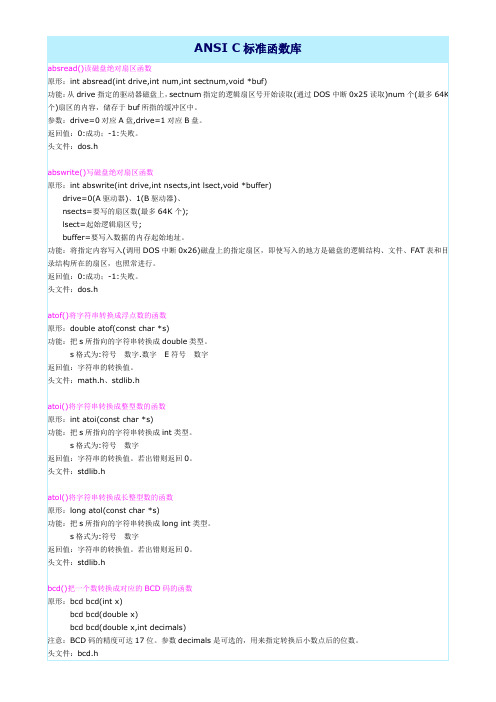
原形:void far *farmalloc(unsigned long nbytes)
使用方式:fptr=farmalloc(字节数);
头文件:stdlib.h
bcd()把一个数转换成对应的BCD码的函数
原形:bcd bcd(int x)
bcd bcd(double x)
bcd bcd(double x,int decimals)
注意:BCD码的精度可达17位。参数decimals是可选的,用来指定转换后小数点后的位数。
头文件:bcd.h
bdos()
原形∶int bdos(intfnum,unsigned dx,unsigned al)
其中fnum是系统调用号;dx是传给寄存器DX的值;al是传给寄存器AL的值;
功能∶DOS系统调用(INT21H)
返回值∶AX中的值
biosdisk()调用BIOS磁盘驱动程序函数
原形:char biosdisk(int cmd,int drive,int head,int track,int sector,int nsects,void *buffer)
功能:根据amode的值,设置由path所指文件的存取权限。
amode的值 存取权限
S_IWRITE允许写
S_IREAD允许读(只读)
S_IREAD|S_IWRITE可读可写
返回值:0(成功);-1(失败)
头文件:io.h、sys\stat.h
clock()
原形∶longclock(void)
功能∶测得从程序开始到调用处处理机所用的时间
功能∶计算arg(弧度)的余弦值
头文件∶math.h
c语言标准库函数手册
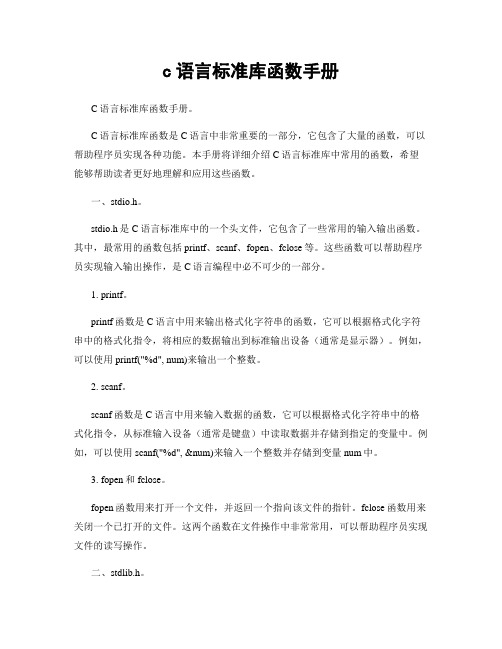
c语言标准库函数手册C语言标准库函数手册。
C语言标准库函数是C语言中非常重要的一部分,它包含了大量的函数,可以帮助程序员实现各种功能。
本手册将详细介绍C语言标准库中常用的函数,希望能够帮助读者更好地理解和应用这些函数。
一、stdio.h。
stdio.h是C语言标准库中的一个头文件,它包含了一些常用的输入输出函数。
其中,最常用的函数包括printf、scanf、fopen、fclose等。
这些函数可以帮助程序员实现输入输出操作,是C语言编程中必不可少的一部分。
1. printf。
printf函数是C语言中用来输出格式化字符串的函数,它可以根据格式化字符串中的格式化指令,将相应的数据输出到标准输出设备(通常是显示器)。
例如,可以使用printf("%d", num)来输出一个整数。
2. scanf。
scanf函数是C语言中用来输入数据的函数,它可以根据格式化字符串中的格式化指令,从标准输入设备(通常是键盘)中读取数据并存储到指定的变量中。
例如,可以使用scanf("%d", &num)来输入一个整数并存储到变量num中。
3. fopen和fclose。
fopen函数用来打开一个文件,并返回一个指向该文件的指针。
fclose函数用来关闭一个已打开的文件。
这两个函数在文件操作中非常常用,可以帮助程序员实现文件的读写操作。
二、stdlib.h。
stdlib.h是C语言标准库中的另一个头文件,它包含了一些常用的通用工具函数。
其中,最常用的函数包括malloc、free、rand、exit等。
这些函数可以帮助程序员实现动态内存分配、随机数生成、程序退出等功能。
1. malloc和free。
malloc函数用来在堆上分配指定大小的内存空间,并返回指向该空间的指针。
free函数用来释放之前分配的内存空间。
这两个函数在动态内存管理中非常重要,可以帮助程序员灵活地管理内存空间。
ANSI C标准函数库(中文)

标准库ANSI C包含了15个头文件Assert.hFloat.hMath.hStdarg.hStdlib.hCtype.hLimits.hSetjmp.hStddef.hString.hErrno.hLocale.hSignal.hStdio.hTime.h标准库本身并不是C语言的构成部分,它是为开发C程序而制定的一种开发环境。
absread()读磁盘绝对扇区函数原形:int absread(int drive,int num,int sectnum,void *buf)功能:从drive指定的驱动器磁盘上,sectnum指定的逻辑扇区号开始读取(通过DOS中断0x25读取)num个(最多64K个)扇区的内容,储存于buf所指的缓冲区中。
参数:drive=0对应A盘,drive=1对应B盘。
返回值:0:成功;-1:失败。
头文件:dos.habswrite()写磁盘绝对扇区函数原形:int abswrite(int drive,int nsects,int lsect,void *buffer)drive=0(A驱动器)、1(B驱动器)、nsects=要写的扇区数(最多64K个);lsect=起始逻辑扇区号;buffer=要写入数据的内存起始地址。
功能:将指定内容写入(调用DOS中断0x26)磁盘上的指定扇区,即使写入的地方是磁盘的逻辑结构、文件、FAT表和目录结构所在的扇区,也照常进行。
返回值:0:成功;-1:失败。
头文件:dos.hatof()将字符串转换成浮点数的函数原形:double atof(const char *s)功能:把s所指向的字符串转换成double类型。
s格式为:符号数字.数字E符号数字返回值:字符串的转换值。
头文件:math.h、stdlib.hatoi()将字符串转换成整型数的函数原形:int atoi(const char *s)功能:把s所指向的字符串转换成int类型。
C++常用标准库函数

C++常用库函数1、常用数学函数头文件#include <math> 或者#include <math.h>2、常用字符串处理函数头文件#include <string> 或者#include <string.h>3、其他常用函数头文件#include <stdlib> 或者#include <stdlib.h>4、实现键盘和文件输入/输出的成员函数头文件#include <iostream> 或者#include <iostream.h>C++的头文件!#include <ctype.h>//字符处理#include <errno.h>//定义错误码#include <float.h>//浮点数处理#include <fstream.h>//文件输入/输出#include <iomanip.h>//参数化输入/输出#include <iostream.h> //数据流输入/输出#include <limits.h> //定义各种数据类型最值常量#include <locale.h> //定义本地化函数#include <math.h> //定义数学函数#include <stdio.h> //定义输入/输出函数#include <stdlib.h> //定义杂项函数及内存分配函数#include <string.h> //字符串处理#include <strstrea.h> //基于数组的输入/输出#include <time.h> //定义关于时间的函数#include <wchar.h> //宽字符处理及输入/输出#include <wctype.h> //宽字符分类标准C++ (同上的不再注释)#include <algorithm> //STL 通用算法#include <bitset> //STL 位集容器#include <cctype>#include <cerrno>#include <clocale>#include <cmath>#include <complex> //复数类#include <cstdio>#include <cstdlib>#include <cstring>#include <ctime>#include <deque> //STL 双端队列容器#include <exception> //异常处理类#include <fstream>#include <functional> //STL 定义运算函数(代替运算符)#include <limits>#include <list> //STL 线性列表容器#include <map> //STL 映射容器#include <iomanip>#include <ios> //基本输入/输出支持#include <iosfwd> //输入/输出系统使用的前置声明#include <iostream>#include <istream> //基本输入流#include <ostream> //基本输出流#include <queue> //STL 队列容器#include <set> //STL 集合容器#include <sstream> //基于字符串的流#include <stack> //STL 堆栈容器#include <stdexcept> //标准异常类#include <streambuf> //底层输入/输出支持#include <string> //字符串类#include <utility> //STL 通用模板类#include <vector> //STL 动态数组容器#include <cwchar>#include <cwctype>using namespace std;C99 增加#include //复数处理#include //浮点环境#include //整数格式转换#include //布尔环境#include //整型环境#include //通用类型数学宏数学函数,所在函数库为math.h、stdlib.h、string.h、float.hint abs(int i) 返回整型参数i的绝对值double cabs(struct complex znum) 返回复数znum的绝对值double fabs(double x) 返回双精度参数x的绝对值long labs(long n) 返回长整型参数n的绝对值double exp(double x) 返回指数函数ex的值double frexp(double value,int *eptr) 返回value=x*2n中x的值,n存贮在eptr中double ldexp(double value,int exp); 返回value*2exp的值double log(double x) 返回logex的值double log10(double x) 返回log10x的值double pow(double x,double y) 返回xy的值double pow10(int p) 返回10p的值double sqrt(double x) 返回+√x的值double acos(double x) 返回x的反余弦cos-1(x)值,x为弧度double asin(double x) 返回x的反正弦sin-1(x)值,x为弧度double atan(double x) 返回x的反正切tan-1(x)值,x为弧度double atan2(double y,double x) 返回y/x的反正切tan-1(x)值,y的x为弧度double cos(double x) 返回x的余弦cos(x)值,x为弧度double sin(double x) 返回x的正弦sin(x)值,x为弧度double tan(double x) 返回x的正切tan(x)值,x为弧度double cosh(double x) 返回x的双曲余弦cosh(x)值,x为弧度double sinh(double x) 返回x的双曲正弦sinh(x)值,x为弧度double tanh(double x) 返回x的双曲正切tanh(x)值,x为弧度double hypot(double x,double y) 返回直角三角形斜边的长度(z),x和y为直角边的长度,z2=x2+y2double ceil(double x) 返回不小于x的最小整数double floor(double x) 返回不大于x的最大整数void srand(unsigned seed) 初始化随机数发生器int rand() 产生一个随机数并返回这个数double poly(double x,int n,double c[])从参数产生一个多项式double modf(double value,double *iptr)将双精度数value分解成尾数和阶double fmod(double x,double y) 返回x/y的余数double frexp(double value,int *eptr) 将双精度数value分成尾数和阶double atof(char *nptr) 将字符串nptr转换成浮点数并返回这个浮点数double atoi(char *nptr) 将字符串nptr转换成整数并返回这个整数double atol(char *nptr) 将字符串nptr转换成长整数并返回这个整数char *ecvt(double value,int ndigit,int *decpt,int *sign)将浮点数value转换成字符串并返回该字符串char *fcvt(double value,int ndigit,int *decpt,int *sign)将浮点数value转换成字符串并返回该字符串char *gcvt(double value,int ndigit,char *buf)将数value转换成字符串并存于buf中,并返回buf的指针char *ultoa(unsigned long value,char *string,int radix)将无符号整型数value转换成字符串并返回该字符串,radix为转换时所用基数char *ltoa(long value,char *string,int radix)将长整型数value转换成字符串并返回该字符串,radix为转换时所用基数char *itoa(int value,char *string,int radix)将整数value转换成字符串存入string,radix为转换时所用基数double atof(char *nptr) 将字符串nptr转换成双精度数,并返回这个数,错误返回0int atoi(char *nptr) 将字符串nptr转换成整型数, 并返回这个数,错误返回0long atol(char *nptr) 将字符串nptr转换成长整型数,并返回这个数,错误返回0double strtod(char *str,char **endptr)将字符串str转换成双精度数,并返回这个数,long strtol(char *str,char **endptr,int base)将字符串str转换成长整型数, 并返回这个数,int matherr(struct exception *e)用户修改数学错误返回信息函数(没有必要使用)double _matherr(_mexcep why,char *fun,double *arg1p,double *arg2p,double retval)用户修改数学错误返回信息函数(没有必要使用)unsigned int _clear87() 清除浮点状态字并返回原来的浮点状态void _fpreset() 重新初使化浮点数学程序包unsigned int _status87() 返回浮点状态字目录函数,所在函数库为dir.h、dos.hint chdir(char *path) 使指定的目录path(如:"C:\\WPS")变成当前的工作目录,成功返回0int findfirst(char *pathname,struct ffblk *ffblk,intattrib)查找指定的文件,成功返回0pathname为指定的目录名和文件名,如"C:\\WPS\\TXT"ffblk为指定的保存文件信息的一个结构,定义如下:┏━━━━━━━━━━━━━━━━━━┓┃struct ffblk┃┃{ ┃┃char ff_reserved[21]; /*DOS保留字*/┃┃char ff_attrib; /*文件属性*/ ┃┃int ff_ftime; /*文件时间*/ ┃┃int ff_fdate; /*文件日期*/ ┃┃long ff_fsize; /*文件长度*/ ┃┃char ff_name[13]; /*文件名*/ ┃┃} ┃┗━━━━━━━━━━━━━━━━━━┛attrib为文件属性,由以下字符代表┏━━━━━━━━━┳━━━━━━━━┓┃FA_RDONL Y 只读文件┃FA_LABEL 卷标号┃┃FA_HIDDEN 隐藏文件┃FA_DIREC 目录┃┃FA_SYSTEM 系统文件┃FA_ARCH 档案┃┗━━━━━━━━━┻━━━━━━━━┛例:struct ffblk ff;findfirst("*.wps",&ff,FA_RDONL Y);int findnext(struct ffblk *ffblk) 取匹配finddirst的文件,成功返回0 void fumerge(char *path,char *drive,char *dir,char *name,char *ext)此函数通过盘符drive(C:、A:等),路径dir(\TC、\BC\LIB等),文件名name(TC、WPS等),扩展名ext(.EXE、.COM等)组成一个文件名存与path中.int fnsplit(char *path,char *drive,char *dir,char *name,char *ext)此函数将文件名path分解成盘符drive(C:、A:等),路径dir(\TC、\BC\LIB 等),文件名name(TC、WPS等),扩展名ext(.EXE、.COM等),并分别存入相应的变量中.int getcurdir(int drive,char *direc) 此函数返回指定驱动器的当前工作目录名称drive 指定的驱动器(0=当前,1=A,2=B,3=C等)direc 保存指定驱动器当前工作路径的变量成功返回0char *getcwd(char *buf,iint n) 此函数取当前工作目录并存入buf中,直到n个字节长为为止.错误返回NULLint getdisk() 取当前正在使用的驱动器,返回一个整数(0=A,1=B,2=C 等)int setdisk(int drive) 设置要使用的驱动器drive(0=A,1=B,2=C等),返回可使用驱动器总数int mkdir(char *pathname) 建立一个新的目录pathname,成功返回0 int rmdir(char *pathname) 删除一个目录pathname,成功返回0char *mktemp(char *template) 构造一个当前目录上没有的文件名并存于template中char *searchpath(char *pathname) 利用MSDOS找出文件filename所在路径,,此函数使用DOS的PA TH变量,未找到文件返回NULL 进程函数,所在函数库为stdlib.h、process.hvoid abort() 此函数通过调用具有出口代码3的_exit写一个终止信息于stderr,并异常终止程序。
c语言标准库函数查询
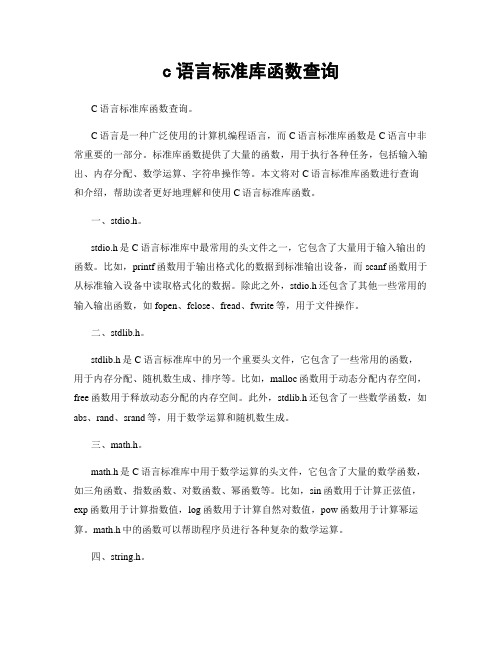
c语言标准库函数查询C语言标准库函数查询。
C语言是一种广泛使用的计算机编程语言,而C语言标准库函数是C语言中非常重要的一部分。
标准库函数提供了大量的函数,用于执行各种任务,包括输入输出、内存分配、数学运算、字符串操作等。
本文将对C语言标准库函数进行查询和介绍,帮助读者更好地理解和使用C语言标准库函数。
一、stdio.h。
stdio.h是C语言标准库中最常用的头文件之一,它包含了大量用于输入输出的函数。
比如,printf函数用于输出格式化的数据到标准输出设备,而scanf函数用于从标准输入设备中读取格式化的数据。
除此之外,stdio.h还包含了其他一些常用的输入输出函数,如fopen、fclose、fread、fwrite等,用于文件操作。
二、stdlib.h。
stdlib.h是C语言标准库中的另一个重要头文件,它包含了一些常用的函数,用于内存分配、随机数生成、排序等。
比如,malloc函数用于动态分配内存空间,free函数用于释放动态分配的内存空间。
此外,stdlib.h还包含了一些数学函数,如abs、rand、srand等,用于数学运算和随机数生成。
三、math.h。
math.h是C语言标准库中用于数学运算的头文件,它包含了大量的数学函数,如三角函数、指数函数、对数函数、幂函数等。
比如,sin函数用于计算正弦值,exp函数用于计算指数值,log函数用于计算自然对数值,pow函数用于计算幂运算。
math.h中的函数可以帮助程序员进行各种复杂的数学运算。
四、string.h。
string.h是C语言标准库中用于字符串操作的头文件,它包含了一些常用的字符串处理函数。
比如,strlen函数用于计算字符串的长度,strcpy函数用于复制字符串,strcat函数用于拼接字符串,strcmp函数用于比较字符串。
string.h中的函数可以帮助程序员进行各种字符串操作,如字符串的复制、拼接、比较等。
五、time.h。
C语言头文件使用大全

C语言头文件使用大全C语言是一种非常流行和强大的编程语言,它广泛用于开发各种应用程序和系统软件。
在C语言中,头文件(header file)起到了非常重要的作用,它们提供了一些函数和变量的声明,以及各种常量和类型的定义。
程序员可以使用这些头文件来访问库函数、宏定义和其他相关的信息,以便更方便地编写代码。
以下是一些常用的C语言头文件的简要介绍:1. stdio.h:这是C语言标准库中最常用的头文件之一,它定义了一些输入和输出的相关函数,如printf(和scanf(。
它还定义了一些常用的数据类型,如FILE(用于文件处理)和size_t(无符号整型)。
2. stdlib.h:这个头文件定义了一些常用的函数,如malloc(和free(,用于内存的动态分配和释放。
它还声明了一些其他重要的函数,如rand(和exit(。
3. string.h:这个头文件包含了一些字符串处理的函数,如strcpy(和strcat(,以及一些和内存空间操作相关的函数,如memset(和memcpy(。
4. math.h:这个头文件包含了一些常用的数学函数,如sin(和cos(。
它还定义了一些常用的数学常量,如PI。
5. ctype.h:这个头文件包含了一些字符处理的函数,如isalpha(和isdigit(。
这些函数可以用来判断一个字符的类型,如字母、数字等。
7. assert.h:这个头文件定义了一个宏函数assert(,用于在程序运行中对表达式进行断言检查。
如果表达式为假,assert(会输出一条错误消息并中止程序的运行。
8. stdarg.h:这个头文件定义了一些宏和类型,用于处理可变参数的函数。
它提供了一些函数,如vprintf(和vsprintf(,用于打印可变参数的输出。
9. errno.h:这个头文件定义了一些全局变量,用于表示各种系统错误。
程序可以使用这些变量来检查一些特定的系统调用是否成功。
10. limits.h:这个头文件定义了一些与整数类型相关的常量,如INT_MAX和UINT_MAX。
ANSIC标准函数库(中文)

ANSIC标准函数库(中文)ANSIC标准函数库(中文)标准库ANSI C包含了15个头文件Assert.hFloat.hMath.hStdarg.hStdlib.hCtype.hLimits.hSetjmp.hStddef.hString.hErrno.hLocale.hSignal.hStdio.hTime.h标准库本身并不是C语言的构成部分,它是为开发C程序而制定的一种开发环境。
absread()读磁盘绝对扇区函数原形:int absread(int drive,int num,int sectnum,void *buf)功能:从drive指定的驱动器磁盘上,sectnum 指定的逻辑扇区号开始读取(通过DOS中断0x25读取)num个(最多64K个)扇区的内容,储存于buf所指的缓冲区中。
参数:drive=0对应A盘,drive=1对应B盘。
返回值:0:成功;-1:失败。
头文件:dos.habswrite()写磁盘绝对扇区函数原形:int abswrite(int drive,int nsects,int lsect,void *buffer)drive=0(A驱动器)、1(B驱动器)、nsects=要写的扇区数(最多64K个);lsect=起始逻辑扇区号;buffer=要写入数据的内存起始地址。
功能:将指定内容写入(调用DOS中断0x26)磁盘上的指定扇区,即使写入的地方是磁盘的逻辑结构、文件、FAT表和目录结构所在的扇区,也照常进行。
返回值:0:成功;-1:失败。
头文件:dos.hatof()将字符串转换成浮点数的函数原形:double atof(const char *s)功能:把s所指向的字符串转换成double类型。
s格式为:符号数字.数字E符号数字返回值:字符串的转换值。
头文件:math.h、stdlib.hatoi()将字符串转换成整型数的函数原形:int atoi(const char *s)功能:把s所指向的字符串转换成int类型。
C标准库
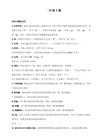
1.1.3 fflush
#include <stdio.h>
int fflush(FILE *stream);
返回:成功为0,失败返回EOF
对输出流(写打开),fflush()用于将已写到缓冲区但尚未写出的全部数据都写到文件中
;对输入流,其结果未定义。如果写过程中发生错误则返回EOF,正常则返回0。
|"rb" |打开二进制文件用于读 |
|"wb" |创建二进制文件用于写,并删除已存在的内容(如果有的话) |
|"ab" |添加;打开或创建二进制文件用于在文件末尾写 |
返回:成功为0,失败为非0值
把文件的名字从oldfname改为newfname。
1.1.7 tmpfile
#include <stdio.h>
FILE *tmpfile(void);
返回:成功为流指针,失败为NULL
以方式"wb+"创建一个临时文件,并返回该流的指针,该文件在被关闭或程序正常结束时
,必须调用fflush()或文件定位函数如fseek()、fsetpos()、rewind()等。
文件名filename的长度最大为FILENAME_MAX个字符,一次最多可打开FOPEN_MAX个文件(
在<stdio.h>中定义)。
1.1.2 freopen
#include <stdio.h>
FILE *freopen(const char *filename, const char *mode,
在%与转换字符之间依次可以有下列标记:
|标记 |说明 |
|- |指定被转换的变元在其字段内左对齐 |
printf函数的用法
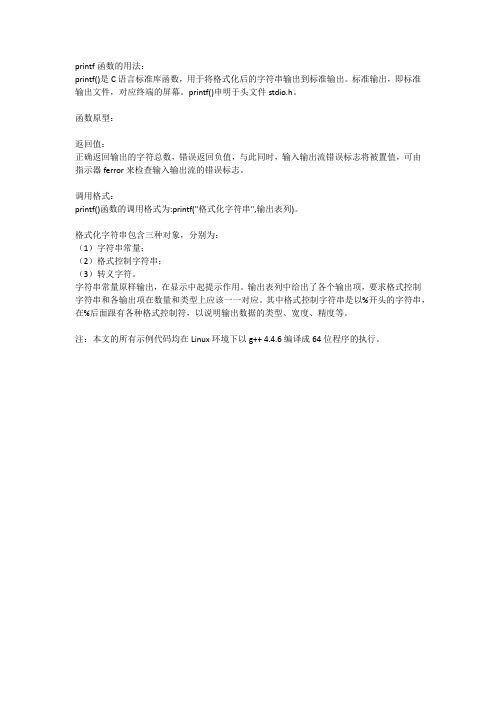
printf函数的用法:
printf()是C语言标准库函数,用于将格式化后的字符串输出到标准输出。
标准输出,即标准输出文件,对应终端的屏幕。
printf()申明于头文件stdio.h。
函数原型:
返回值:
正确返回输出的字符总数,错误返回负值,与此同时,输入输出流错误标志将被置值,可由指示器ferror来检查输入输出流的错误标志。
调用格式:
printf()函数的调用格式为:printf("格式化字符串",输出表列)。
格式化字符串包含三种对象,分别为:
(1)字符串常量;
(2)格式控制字符串;
(3)转义字符。
字符串常量原样输出,在显示中起提示作用。
输出表列中给出了各个输出项,要求格式控制字符串和各输出项在数量和类型上应该一一对应。
其中格式控制字符串是以%开头的字符串,在%后面跟有各种格式控制符,以说明输出数据的类型、宽度、精度等。
注:本文的所有示例代码均在Linux环境下以g++ 4.4.6编译成64位程序的执行。
C语言中常用的几个头文件及库函数

C语⾔中常⽤的⼏个头⽂件及库函数不完全统计,C语⾔标准库中的头⽂件有15个之多,所以我主要介绍常⽤的这四个头⽂件stdio.h,string.h,math.h,stdlib.h,以后⽤到其他的再做补充。
下⾯上⼲货:1.<stdio.h>:定义了输⼊输出函数、类型以及宏,函数⼏乎占了标准库的1/3。
(1)⽂件访问。
FILE *fopen(“filename”,“mode”):以mode模式打开地址为'filename'的⽂件,并返回⽂件指针。
访问模式主要是“r”:只读; “w” :只写,并删除已有内容; “a”:追加,在末尾追加;“r+”, “w+”:读写; “a+”追加,上述结尾加“b”:⼆进制⽂件操作。
注意:其中r是打开⽂件,⽽w会创建(如果⽂件不存在); w会覆盖原有内容,a则是在原有⽂件末尾追加。
int fclose(FILE *f):释放缓冲区数据,关闭流。
下⾯两个没太⽤过:FILE *freopen(“filename”,“mode”,FILE * f):以mode模式打开地址为'filename'的⽂件,并将该⽂件与流f2关联。
int fflush(FILE *f):将已写到缓冲区但未写⼊⽂件中的所有数据写⼊⽂件中。
(2)⼆进制输⼊/输出fread(*ptr,size,n,FILE* f):从f中读取n个长度为size的对象,并放⼊ptr指向的数组中。
fwrite(*ptr,size,n,FILE* f):从ptr指向数组中读取n个长度为size的对象,并写⼊f中。
注意:要注意write与read的对象,读和写都是针对⽂件流f的。
(3)⾮格式化输⼊/输出int fgetc/getc(FILE *f):返回流f的下⼀个字符,到达⽂件末尾/发⽣错误,则返回EOF。
int fputc/putc(int c, FILE *f)将字符c输⼊到流f中。
C语言头文件大全

标准C语言头文件ISO C标准定义的头文件(24项)<assert.h> 验证程序断言<complex.h> 支持复数算术运算<ctype.h> 字符类型<errno.h> 出错码<fenv.h> 浮点环境<float.h> 浮点常量<inttypes.h> 整型格式转换<iso646.h> 替代关系操作符宏<limits.h> 实现常量<locale.h> 局部类别<math.h> 数学常量<setjmp.h> 非局部goto<signal.h> 信号<stdarg.h> 可变参数表<stdbool.h> 布尔类型和值<stddef.h> 标准定义<stdint.h> 整型<stdio.h> 标准I/O库<stdlib.h> 实用程序库函数<string.h> 字符串操作<tgmath.h> 通用类型数学宏<time.h> 时间和日期<wchar.h> 宽字符支持<wctype.h> 宽字符分类和映射支持POSIX标准定义的必须的头文件(26项)<dirent.h> 目录项<fcntl.h> 文件控制<fnmatch.h> 文件名匹配类型<glob.h> 路径名模式匹配类型<grp.h> 组文件<netdb.h> 网络数据库操作<pwd.h> 口令文件<regex.h> 正则表达式<tar.h> tar归档值<termios.h> 终端I/O <unistd.h> 符号常量<utime.h> 文件时间<wordexp.h> 字扩展类型<arpa/inet.h> Internet定义<net/if.h> 套接字本地接口<netinet/in.h> Internet地址族 <netinet/tcp.h> 传输控制协议<sys/mman.h> 内存管理声明<sys/select.h> select函数<sys/socket.h> 套接字接口<sys/stat.h> 文件状态<sys/times.h> 进程时间<sys/types.h> 基本系统数据类型<sys/un.h> UNIX域套接字定义<sys/utsname.h>系统名<sys/wait.h> 进程控制POSIX标准定义的XSI扩展头文件(26项)<cpio.h> cpio归档值<dlfcn.h> 动态链接<fmtmsg.h> 消息显示结构<ftw.h> 文件树漫游<iconv.h> 代码集转换实用程序<langinfo.h> 语言信息常量<libgen.h> 模式匹配函数定义<monetary.h> 货币类型<ndbm.h> 数据库操作<nl_types.h> 消息类别<poll.h> 轮询函数<search.h> 搜索表<strings.h> 字符串操作<syslog.h> 系统出错日志记录<ucontext.h> 用户上下文<ulimit.h> 用户限制<utmpx.h> 用户帐户数据库<sys/ipc.h> IPC<sys/msg.h> 消息队列<sys/resource.h> 资源操作<sys/sem.h> 信号量<sys/shm.h> 共享存储<sys/statvfs.h> 文件系统信息<sys/time.h> 时间类型<sys/timeb.h> 附加的时间<sys/uio.h> 矢量I/O操作POSIX标准定义的可选头文件(8项)<aio.h> 异步I/O <mqueue.h> 消息队列<pthread.h> 线程<sched.h> 执行调度<semaphore.h> 信号量<spawn.h> 实时spawn接口<stropts.h> XSI STREAMS接口<trace.h> 时间跟踪标准 C++ 语言头文件(54个其中16个用于构建STL,3个为附加非必须)<algorithm>STL通用算法<bitset> STL位集容器<cassert> 用于在程序运行时执行断言<cctype> 字符处理<cerrno> 错误码<cfloat> 用于测试浮点类型属性<ciso646> ISO646变体字符集<climits> 测试整数类型属性<clocale> 本地化函数<cmath> 数学函数<complex>复数类<csetjmp> 执行非内部的goto语句<csignal> 信号<cstdarg> 访问参数数量变化的函数<cstddef> 用于定义实用的类型和宏<cstdio> 输入/输出<cstdlib> 杂项函数及内存分配<cstring> 字符串<ctime> 时间<cwchar> 宽字符处理及输入/输出<cwctype> 宽字符分类<deque> STL双端队列容器<exception> 异常处理类<fstream> 文件流<functional> STL函数对象<iomanip> 参数化输入/输出<ios>基本输入/输出支持<iosfwd> 输入/输出前置声明<iostream> 数据流输入/输出<istream> 基本输入流<iterator> 遍历序列的类<limits> 各种数据类型最值常量<list>STL线性列表容器<locale> 国际化支持<map> STL映射容器<memory> 专用内存分配器<new> 基本内存分配和释放<numeric> 通用的数字操作<ostream> 基本输出流<queue> STL 队列容器<set> STL 集合容器<sstream> 基于字符串的流<stack> STL 堆栈容器<stdexcept> 标准异常类<streambuf> iostream 的缓冲区类<string> 字符串类<strstream> 非内存字符序列的流类<typeinfo> 运行时类型标识<utility> STL 通用模板类<valarray> 支持值数组的类和模版类<vector> STL 动态数组容器标准C++附加的头文件(3个)非必须<hash_map> <hash_set> <slist>The Standard C++ library consists of 51 required headers.This implementation also includes three additional headers,<hash_map>,<hash_set>,and <slist>,not required by the C++ Standard,for a total of 54 headers.Of these 54 headers,16 constitute the Standard Template Library,or STL.These are indicated below with the notation<algorithm> -- (STL) for defining numerous templates that implement useful algorithms<bitset> -- for defining a template class that administers sets of bits<complex> -- for defining a template class that supports complex arithmetic<deque> -- (STL) for defining a template class that implements a deque container<exception> -- for defining several functions that control exception handling<fstream> -- for defining several iostreams template classes that manipulate exteral files<functional>-- (STL) for defining several templates that help construct predicates for the templates defined in <algorithm> and <numeric><hash_map> -- (STL) for defining template classes that implement hashed associative containersthat map keys to values<hash_set> -- (STL) for defining template classes that implement hashed associative containers<iomanip> -- for declaring several iostreams manipulators that take an argument<ios> -- for defining the template class that serves as the base for many iostreams classes<iosfwd> -- for declaring several iostreams template classes before they are necessarilydefined<iostream> -- for declaring the iostreams objects that manipulate the standard streams<istream> -- for defining the template class that performs extractions<iterator> -- (STL) for defining several templates that help define and manipulate iterators<limits> -- for testing numeric type properties<list>-- (STL) for defining a template class that implements a doubly linked list container<locale> -- for defining several classes and templates that controllocale-specific behavior, as in the iostreams classes<map>-- (STL) for defining template classes that implement associative containers thatmap keys to values<memory>-- (STL) for defining several templates that allocate and free storage for variouscontainer classes<new> -- for declaring several functions that allocate and free storage<numeric>-- (STL) for defining several templates that implement useful numeric functions<ostream> -- for defining the template class that performs insertions<queue> -- (STL) for defining a template class that implements a queue container<set>-- (STL) for defining template classes that implement associative containers<slist>-- (STL) for defining a template class that implements a singly linked list container<sstream> -- for defining several iostreams template classes that manipulate string containers<stack> -- (STL) for defining a template class that implements a stack container<stdexcept> -- for defining several classes useful for reporting exceptions<streambuf> -- for defining template classes that buffer iostreams operations<string> -- for defining a template class that implements a string container<strstream> -- for defining several iostreams classes that manipulate in-memory character sequences<typeinfo> -- for defining class type_info, the result of the typeid operator<utility>-- (STL) for defining several templates of general utility<valarray> -- for defining several classes and template classes that support value-oriented arrays<vector>-- (STL) for defining a template class that implements a vector container新的C标准库<cassert> -- for enforcing assertions when functions execute<cctype> -- for classifying characters<cerrno> -- for testing error codes reported by library functions<cfloat> -- for testing floating-point type properties<ciso646> -- for programming in ISO 646 variant character sets<climits> -- for testing integer type properties<clocale> -- for adapting to different cultural conventions<cmath> -- for computing common mathematical functions<csetjmp> -- for executing nonlocal goto statements<csignal> -- for controlling various exceptional conditions<cstdarg> -- for accessing a varying number of arguments<cstddef> -- for defining several useful types and macros<cstdio> -- for performing input and output<cstdlib> -- for performing a variety of operations<cstring> -- for manipulating several kinds of strings<ctime> -- for converting between various time and date formats<cwchar> -- for manipulating wide streams and several kinds of strings<cwctype> -- for classifying wide characters旧的C标准库<assert.h> -- for enforcing assertions when functions execute<ctype.h> -- for classifying characters<errno.h> -- for testing error codes reported by library functions<float.h> -- for testing floating-point type properties<iso646.h> -- for programming in ISO 646 variant character sets<limits.h> -- for testing integer type properties<locale.h> -- for adapting to different cultural conventions<math.h> -- for computing common mathematical functions<setjmp.h> -- for executing nonlocal goto statements<signal.h> -- for controlling various exceptional conditions<stdarg.h> -- for accessing a varying number of arguments<stddef.h> -- for defining several useful types and macros<stdio.h> -- for performing input and output<stdlib.h> -- for performing a variety of operations<string.h> -- for manipulating several kinds of strings<time.h> -- for converting between various time and date formats<wchar.h> -- for manipulating wide streams and several kinds of strings<wctype.h> -- for classifying wide charactersFinally, in this implementation, the Standard C++ library also includes several headers for compatibility with traditional C++ libraries:<fstream.h> -- for defining several iostreams template classes that manipulate exteral files <iomanip.h> -- for declaring several iostreams manipulators that take an argument<iostream.h> -- for declaring the iostreams objects that manipulate the standard streams <new.h> -- for declaring several functions that allocate and free storage<stl.h> -- for declaring several template classes that aid migration from older versions of the Standard Template Library。
C语言头文件大全
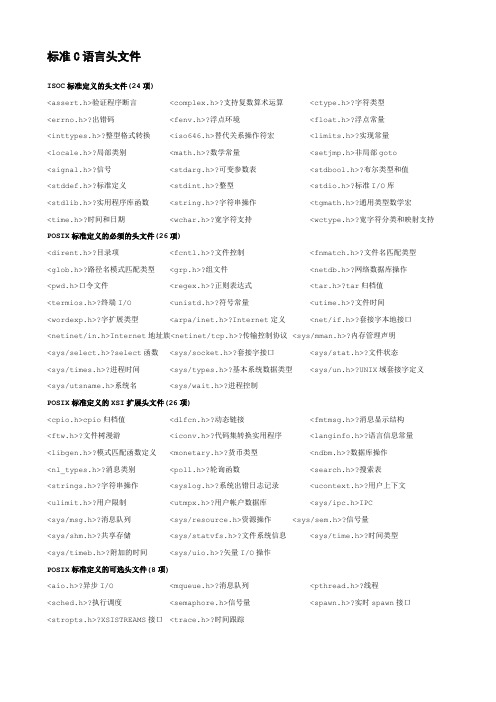
标准C语言头文件ISOC标准定义的头文件(24项)<assert.h>验证程序断言<complex.h>?支持复数算术运算<ctype.h>?字符类型<errno.h>?出错码<fenv.h>?浮点环境<float.h>?浮点常量<inttypes.h>?整型格式转换<iso646.h>替代关系操作符宏<limits.h>?实现常量<locale.h>?局部类别<math.h>?数学常量<setjmp.h>非局部goto<signal.h>?信号<stdarg.h>?可变参数表<stdbool.h>?布尔类型和值<stddef.h>?标准定义<stdint.h>?整型<stdio.h>?标准I/O库<stdlib.h>?实用程序库函数<string.h>?字符串操作<tgmath.h>?通用类型数学宏<time.h>?时间和日期<wchar.h>?宽字符支持<wctype.h>?宽字符分类和映射支持POSIX标准定义的必须的头文件(26项)<dirent.h>?目录项<fcntl.h>?文件控制<fnmatch.h>?文件名匹配类型<glob.h>?路径名模式匹配类型<grp.h>?组文件<netdb.h>?网络数据库操作<pwd.h>口令文件<regex.h>?正则表达式<tar.h>?tar归档值<termios.h>?终端I/O <unistd.h>?符号常量<utime.h>?文件时间<wordexp.h>?字扩展类型<arpa/inet.h>?Internet定义<net/if.h>?套接字本地接口<netinet/in.h>Internet地址族<netinet/tcp.h>?传输控制协议 <sys/mman.h>?内存管理声明<sys/select.h>?select函数<sys/socket.h>?套接字接口<sys/stat.h>?文件状态<sys/times.h>?进程时间<sys/types.h>?基本系统数据类型<sys/un.h>?UNIX域套接字定义<sys/utsname.h>系统名<sys/wait.h>?进程控制POSIX标准定义的XSI扩展头文件(26项)<cpio.h>cpio归档值<dlfcn.h>?动态链接<fmtmsg.h>?消息显示结构<ftw.h>?文件树漫游<iconv.h>?代码集转换实用程序<langinfo.h>?语言信息常量<libgen.h>?模式匹配函数定义<monetary.h>?货币类型<ndbm.h>?数据库操作<nl_types.h>?消息类别<poll.h>?轮询函数<search.h>?搜索表<strings.h>?字符串操作<syslog.h>?系统出错日志记录<ucontext.h>?用户上下文<ulimit.h>?用户限制<utmpx.h>?用户帐户数据库<sys/ipc.h>IPC<sys/msg.h>?消息队列<sys/resource.h>资源操作<sys/sem.h>?信号量<sys/shm.h>?共享存储<sys/statvfs.h>?文件系统信息<sys/time.h>?时间类型<sys/timeb.h>?附加的时间<sys/uio.h>?矢量I/O操作POSIX标准定义的可选头文件(8项)<aio.h>?异步I/O <mqueue.h>?消息队列<pthread.h>?线程<sched.h>?执行调度<semaphore.h>信号量<spawn.h>?实时spawn接口<stropts.h>?XSISTREAMS接口<trace.h>?时间跟踪标准C++语言头文件(54个其中16个用于构建STL,3个为附加非必须)<algorithm>STL通用算法<bitset>STL位集容器<cassert>?用于在程序运行时执行断言<cctype>字符处理<cerrno>错误码<cfloat>?用于测试浮点类型属性<ciso646>?ISO646变体字符集<climits>?测试整数类型属性<clocale>本地化函数<cmath> 数学函数<complex>复数类<csetjmp>?执行非内部的goto语句<csignal>?信号<cstdarg>?访问参数数量变化的函数<cstddef>?用于定义实用的类型和宏<cstdio>输入/输出<cstdlib>杂项函数及内存分配<cstring>字符串<ctime> 时间<cwchar>宽字符处理及输入/输出<cwctype>宽字符分类<deque>STL双端队列容器<exception>异常处理类<fstream>文件流<functional>STL函数对象<iomanip>参数化输入/输出<ios>基本输入/输出支持<iosfwd>输入/输出前置声明<iostream>数据流输入/输出<istream>基本输入流<iterator>遍历序列的类<limits>各种数据类型最值常量<list>STL线性列表容器<locale>国际化支持<map>STL映射容器<memory>专用内存分配器<new>基本内存分配和释放? <numeric>通用的数字操作<ostream>基本输出流<queue> STL队列容器<set>STL集合容器<sstream>基于字符串的流<stack>STL堆栈容器<stdexcept>标准异常类<streambuf>iostream的缓冲区类<string>字符串类<strstream>?非内存字符序列的流类<typeinfo> 运行时类型标识<utility>STL通用模板类<valarray>?支持值数组的类和模版类<vector>STL动态数组容器标准C++附加的头文件(3个)非必须<hash_map> <hash_set> <slist>TheStandardC++libraryconsistsof51requiredheaders.Thisimplementationalsoincludesthreeaddit ionalheaders,<hash_map>,<hash_set>,and<slist>,notrequiredbytheC++Standard,foratotalof54he aders.Ofthese54headers,16constitutetheStandardTemplateLibrary,orSTL.Theseareindicatedbelo wwiththenotation<algorithm>--(STL)fordefiningnumeroustemplatesthatimplementusefulalgorithms<bitset> --fordefiningatemplateclassthatadministerssetsofbits<complex> --fordefiningatemplateclassthatsupportscomplexarithmetic<deque>--(STL)fordefiningatemplateclassthatimplementsadequecontainer<exception>--fordefiningseveralfunctionsthatcontrolexceptionhandling<fstream> --fordefiningseveraliostreamstemplateclassesthatmanipulateexteralfiles<functional>--(STL)fordefiningseveraltemplatesthathelpconstructpredicatesfor thetemplatesdefinedin<algorithm>and<numeric><hash_map>--(STL)fordefiningtemplateclassesthatimplementhashedassociativecontainers thatmapkeystovalues<hash_set>--(STL)fordefiningtemplateclassesthatimplementhashedassociativecontainers<iomanip> --fordeclaringseveraliostreamsmanipulatorsthattakeanargument<ios> --fordefiningthetemplateclassthatservesasthebaseformanyiostreamsclasses<iosfwd> --fordeclaringseveraliostreamstemplateclassesbeforetheyarenecessarilydefined<iostream> --fordeclaringtheiostreamsobjectsthatmanipulatethestandardstreams<istream> --fordefiningthetemplateclassthatperformsextractions<iterator>--(STL)fordefiningseveraltemplatesthathelpdefineandmanipulateiterators<limits> --fortestingnumerictypeproperties<list>--(STL)fordefiningatemplateclassthatimplementsadoublylinkedlistcontainer<locale> --fordefiningseveralclassesandtemplatesthatcontrollocale-specificbehavior,asintheiostreamsclasses<map>--(STL)fordefiningtemplateclassesthatimplementassociativecontainersthat mapkeystovalues<memory>--(STL)fordefiningseveraltemplatesthatallocateandfreestorageforvarious containerclasses<new> --fordeclaringseveralfunctionsthatallocateandfreestorage<numeric>--(STL)fordefiningseveraltemplatesthatimplementusefulnumericfunctions<ostream> --fordefiningthetemplateclassthatperformsinsertions<queue>--(STL)fordefiningatemplateclassthatimplementsaqueuecontainer<set>--(STL)fordefiningtemplateclassesthatimplementassociativecontainers<slist>--(STL)fordefiningatemplateclassthatimplementsasinglylinkedlistcontainer<sstream>--fordefiningseveraliostreamstemplateclassesthatmanipulatestringcontainers<stack>--(STL)fordefiningatemplateclassthatimplementsastackcontainer<stdexcept>--fordefiningseveralclassesusefulforreportingexceptions<streambuf>--fordefiningtemplateclassesthatbufferiostreamsoperations<string> --fordefiningatemplateclassthatimplementsastringcontainer<strstream>--fordefiningseveraliostreamsclassesthatmanipulatein-memorycharacter sequences<typeinfo> --fordefiningclasstype_info,theresultofthetypeidoperator<utility>--(STL)fordefiningseveraltemplatesofgeneralutility<valarray> --fordefiningseveralclassesandtemplateclassesthatsupportvalue-oriented arrays<vector>--(STL)fordefiningatemplateclassthatimplementsavectorcontainer新的C标准库<cassert> --forenforcingassertionswhenfunctionsexecute<cctype> --forclassifyingcharacters<cerrno> --fortestingerrorcodesreportedbylibraryfunctions<cfloat> --fortestingfloating-pointtypeproperties<ciso646> --forprogramminginISO646variantcharactersets<climits> --fortestingintegertypeproperties<clocale> --foradaptingtodifferentculturalconventions<cmath> --forcomputingcommonmathematicalfunctions<csetjmp> --forexecutingnonlocalgotostatements<csignal> --forcontrollingvariousexceptionalconditions<cstdarg> --foraccessingavaryingnumberofarguments<cstddef> --fordefiningseveralusefultypesandmacros<cstdio> --forperforminginputandoutput<cstdlib> --forperformingavarietyofoperations<cstring> --formanipulatingseveralkindsofstrings<ctime> --forconvertingbetweenvarioustimeanddateformats<cwchar> --formanipulatingwidestreamsandseveralkindsofstrings<cwctype> --forclassifyingwidecharacters旧的C标准库<assert.h> --forenforcingassertionswhenfunctionsexecute<ctype.h> --forclassifyingcharacters<errno.h> --fortestingerrorcodesreportedbylibraryfunctions<float.h> --fortestingfloating-pointtypeproperties<iso646.h> --forprogramminginISO646variantcharactersets<limits.h> --fortestingintegertypeproperties<locale.h> --foradaptingtodifferentculturalconventions<math.h> --forcomputingcommonmathematicalfunctions<setjmp.h> --forexecutingnonlocalgotostatements<signal.h> --forcontrollingvariousexceptionalconditions<stdarg.h> --foraccessingavaryingnumberofarguments<stddef.h> --fordefiningseveralusefultypesandmacros<stdio.h> --forperforminginputandoutput<stdlib.h> --forperformingavarietyofoperations<string.h> --formanipulatingseveralkindsofstrings<time.h> --forconvertingbetweenvarioustimeanddateformats<wchar.h> --formanipulatingwidestreamsandseveralkindsofstrings<wctype.h> --forclassifyingwidecharactersFinally,inthisimplementation,theStandardC++libraryalsoincludesseveralheadersforcompatibil itywithtraditionalC++libraries:<fstream.h>--fordefiningseveraliostreamstemplateclassesthatmanipulateexteralfiles<iomanip.h>--fordeclaringseveraliostreamsmanipulatorsthattakeanargument<iostream.h>--fordeclaringtheiostreamsobjectsthatmanipulatethestandardstreams<new.h> --fordeclaringseveralfunctionsthatallocateandfreestorage<stl.h> --fordeclaringseveraltemplateclassesthataidmigrationfromolderversions oftheStandardTemplateLibrary。
- 1、下载文档前请自行甄别文档内容的完整性,平台不提供额外的编辑、内容补充、找答案等附加服务。
- 2、"仅部分预览"的文档,不可在线预览部分如存在完整性等问题,可反馈申请退款(可完整预览的文档不适用该条件!)。
- 3、如文档侵犯您的权益,请联系客服反馈,我们会尽快为您处理(人工客服工作时间:9:00-18:30)。
C++ 标准库中函数所对应的头文件名字头文件========================================== abort <cstdlib>accumulate <numeric>allocator <memory>auto_ptr <memory>back_inserter <memory>bad_alloc <new>bad_cast <typeinfo>bind2nd <functional>bitset <bitset>boolalpha <iostream>cerr <iostream>cin <iostream>copy <algorithm>count <algorithm>count_if <algorithm>cout <iostream>dec <iostream>deque <deque>endl <iostream>ends <iostream>equal_range <algorithm>exception <exception>fill <algorithm>fill_n <algorithm>find <algorithm>find_end <algorithm>find_first_of <algorithm>fixed <iostream>flush <iostream>for_each <algorithm> front_inserter <iterator> internal <iostream>ios_base <ios_base> isalpha <cctype>islower <cctype>ispunct <cctype> isspace <cctype> istream<iostream> istream_iterator <iterator> istringstream <sstream> isupper <cctype>left <iostream> less_equal <functional>list <list>logic_error <stdexcept> lower_bound <algorithm> make_pair <utility>map <map>max <algorithm> min <algorithm> multimap <map> multiset <set> negate <functional> noboolalpha <iostream> noshowbase <iostream> noshowpoint <iostream>noskipws <iostream> notl <functional> nounitbuf <iostream> nouppercase <iostream>nth_element <algorithm> oct <iostream> ofstream <fstream> ostream <iostream> ostream_iterator <iterator> ostringstream <sstream>out_of_range <stdexcept> pair <utility> partial_sort <algorithm> plus <functional> priority_queue <queue> ptrdiff_t <cstddef> queue <queue> range_error <stdexcept> replace <algorithm> replace_copy <algorithm> reverse_interator <interator> right <iostream> runtim e_error <stdexcept> scientific <iostream> set <set>set_difference <algorithm> set_intersection <algorithm>set_union <algorithm> setfill <iomanip> setprecision <iomanip>setw <iomanip> showbase <iostream> showpoint <iostream> size_t <cstddef> skipws <iostream> sort <algrithm> sqrt <c m ath> stable_sort <algorithm> stack <stack> strcm p <cstring> strcpy <cstring> string <string> stringstream <sstream>strlen <cstring> strncpy <cstring> terminate <exception> tolower <cctype> toupper <cctype> unexcepted <exception> uninitialized_copy <memory> unitbuf <iostream> unique <algorithm> unique <algorithm> upper_bound <algorithm> uppercase <iostream> vector <vector>头文件说明#include <assert.h> //设定插入点#include <cctype.h> //字符处理#include <errno.h> //定义错误码#include <float.h> //浮点数处理#include <fstream.h> //文件输入/输出#include <iomanip.h> //参数化输入/输出#include <iostream.h> //数据流输入/输出#include <limits.h> //定义各种数据类型最值常量#include <locale.h> //定义本地化函数#include <math.h> //定义数学函数#include <stdio.h> //定义输入/输出函数#include <stdlib.h> //定义杂项函数及内存分配函数#include <string.h> //字符串处理#include <strstrea.h> //基于数组的输入/输出#include <time.h> //定义关于时间的函数#include <wchar.h> //宽字符处理及输入/输出#include <wctype.h> //宽字符分类//////////////////////////////////////////////////////////////////////////标准C++ (同上的不再注释)#include <algorithm> //STL 通用算法#include <bitset> //STL 位集容器#include <cctype>#include <cerrno>#include <clocale>#include <cmath>#include <complex> //复数类#include <cstdio>#include <cstdlib>#include <cstring>#include <ctime>#include <deque> //STL 双端队列容器#include <exception> //异常处理类#include <fstream>#include <functional> //STL 定义运算函数(代替运算符)#include <limits>#include <list> //STL 线性列表容器#include <map> //STL 映射容器#include <iomanip>#include <ios> //基本输入/输出支持#include <iosfwd> //输入/输出系统使用的前置声明#include <iostream>#include <istream> //基本输入流#include <ostream> //基本输出流#include <queue> //STL 队列容器#include <set> //STL 集合容器#include <sstream> //基于字符串的流#include <stack> //STL 堆栈容器#include <stdexcept> //标准异常类#include <streambuf> //底层输入/输出支持#include <string> //字符串类#include <utility> //STL 通用模板类#include <vector> //STL 动态数组容器#include <cwchar>#include <cwctype>using namespace std;//////////////////////////////////////////////////////////////////////////C99 增加#include <complex.h> //复数处理#include <fenv.h> //浮点环境#include <inttypes.h> //整数格式转换#include <stdbool.h> //布尔环境#include <stdint.h> //整型环境#include <tgmath.h> //通用类型数学宏不同的编译器还会提供特有的头。
